IN WITH THE NEW
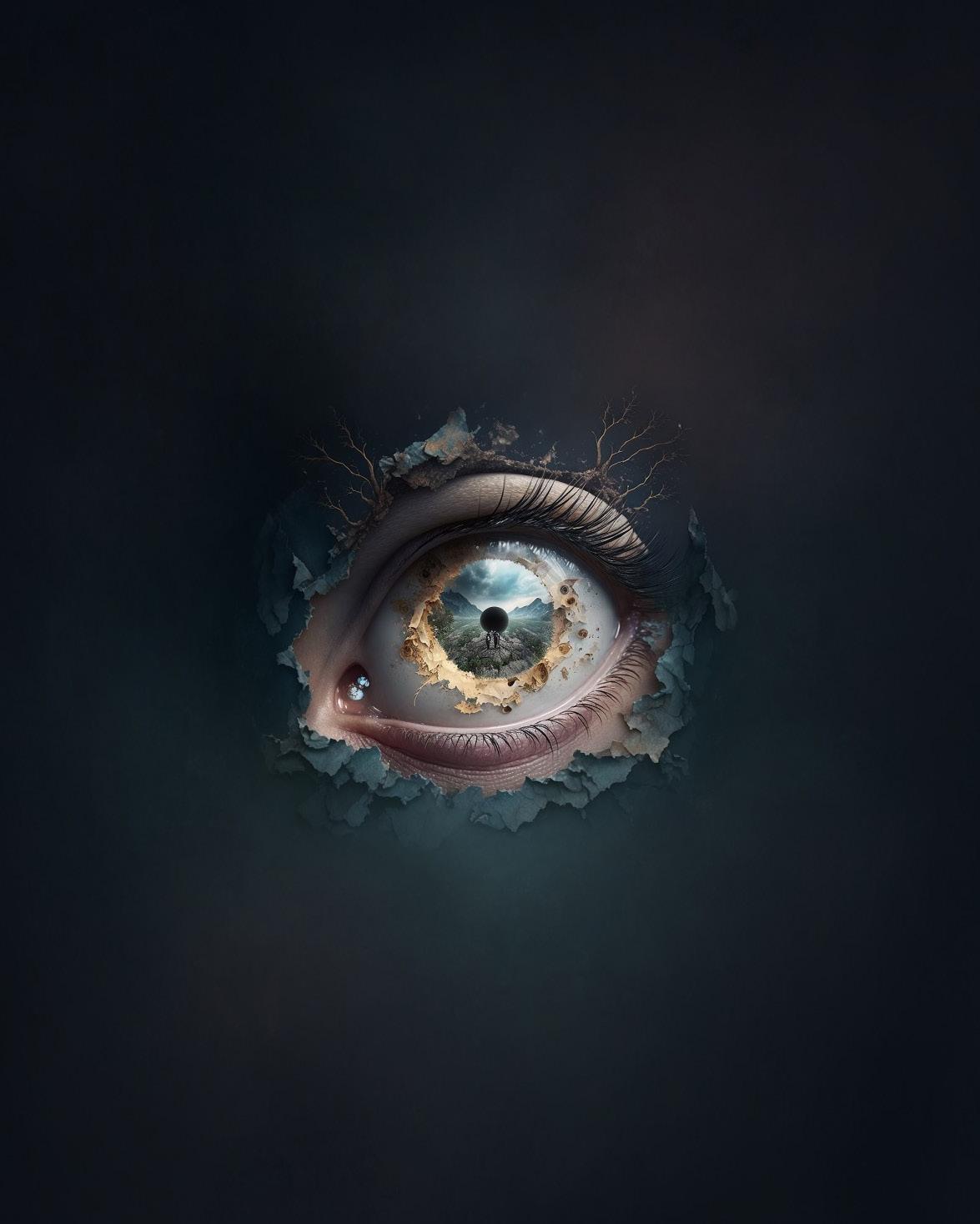
MEDIUM MAGAZINE
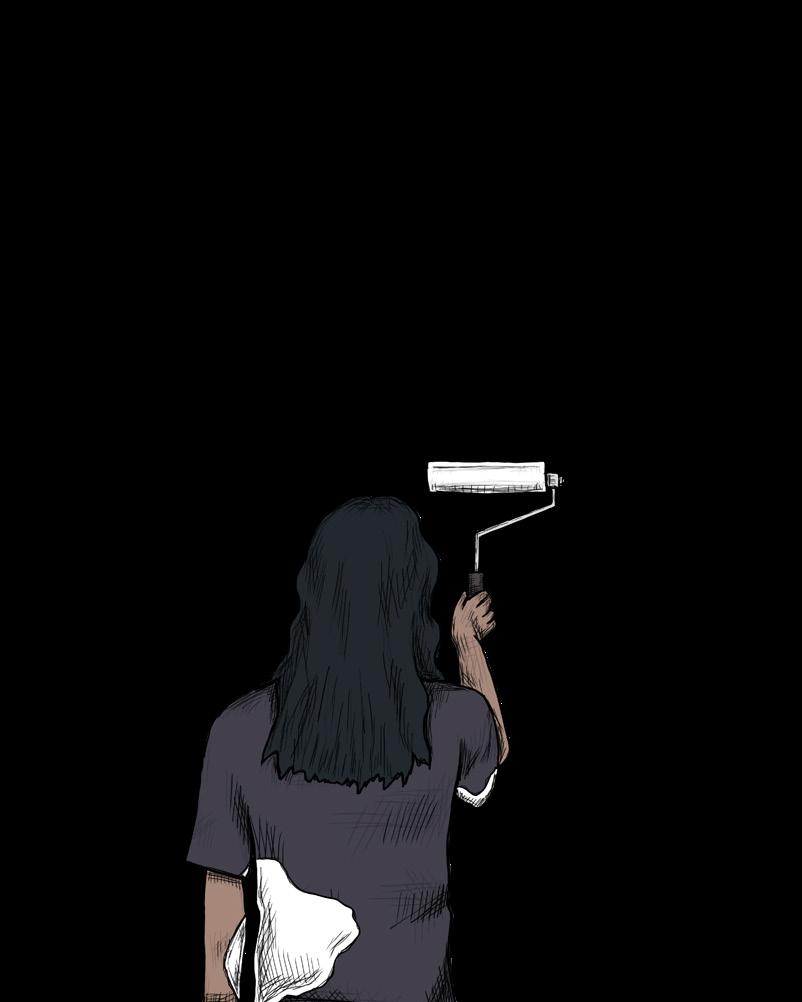
The cover of the “In With The New” Medium Magazine was created using Midjourney, an artificial intelligence (AI) platform that generates images from textual prompts.
We wanted Midjourney to take the lead in our cover design—to show us the full potential of AI-generated art; so, we simply entered the title of our magazine and let the interface use its imagination. The image of our choosing was subsequently manipulated in Procreate to fit our cover format.
“And in the evening After the fire and the light One thing is certain: Nothing can hold back the light Time is relentless And as the past disappears We’re on the verge of all things new”
― Billy Joel, “Two Thousand Years”
4 MEDIUM MAGAZINE
IN WITH THE NEW
MM 5
MAGAZINE
MEDIUM
Masthead
Editor-in Chief
ELIZABETH PROVOST
Managing Editor
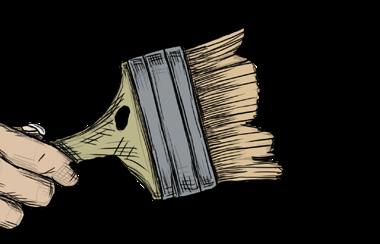
JULIANA STACEY
Director of Design
MANJOT PABLA
Copy Editors
AIDAN THOMPSON
Writers
KAREENA KAILASS
ELIZABETH PROVOST
AIDAN THOMPSON
JESTINA HAJJAR
RADHIA RAMEEZ
JULIANA STACEY
EMILY ROGERS
ROLA FAWZY
SAMIRA KARIMOVA
RIVER KNOTT
AIA JABER
OLGA FEDOSSENKO
RIVER KNOTT Published
ERIN DELANEY
www.themedium.ca
All content printed in Medium Magazine is the sole property of its creators and cannot be used without consent. Opinions expressed in this publication are exclusively of the author and do not necessarily reflect those of Medium Magazine
Printing by Master Web Inc.
6 MEDIUM MAGAZINE
by Medium II Publications
Mississauga
N., Student
3359
Rd.
Center, Room 200 Mississauga, ON L5L 1C6
Dear Future You, You Are Art: A Letter in Four Parts / Kareena Kailass
Painting Love: A Reflection on Love and Museums / Elizabeth Provost
Pop Culture is Dead—But It’s Probably for the Best / Aidan Thompson
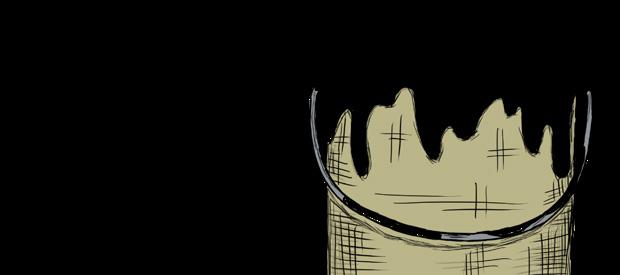
Performance Anxiety: The Pressures of Performing Queerness / Jestina Hajjar
The New Meaning of Octobers / Radhia Rameez
Holding Hands with Grief / Juliana Stacey
Renew Through Life / Emily Rogers
I Am Not My Sister’s Mother / Rola Fawzy
Brushworks of Tomorrow / Samira Karimova
MM 7
Compulsions,
Crashes
Mind | Body | Soul / Aia Jaber Love Me, Love Me Not / Olga Fedossenko What Happens Next is Up to You / Erin Delaney
11 13 19 23 27 33 39 45 49 55 59 63 69
Concussions,
and Car
/ River Knott
Table of Contents
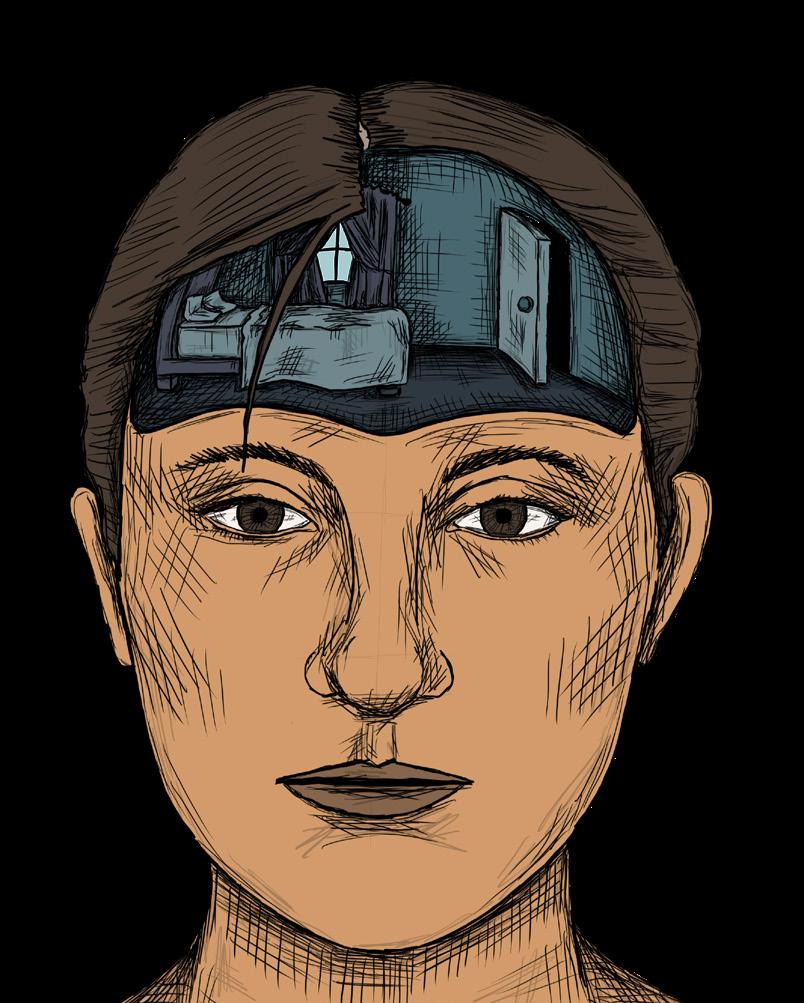
Editor’s Note

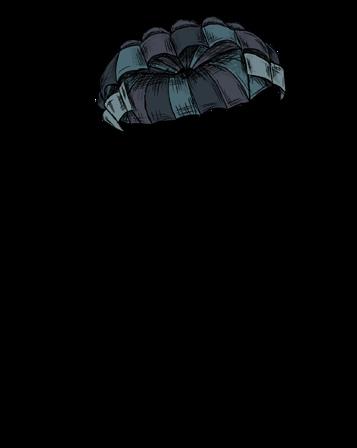
“Out With The Old,” the first Medium Magazine of Volume 49, welcomed you into the world of nostalgia. Now, with “In With The New,” we’re ready to look towards the future.
Writing about “the new” meant pondering over what is to come, what happens next, and what might be. Nothing for certain. Nothing definitive.
However, the new is not always synonymous with what has yet to be experienced. The new can be a fresh perspective, or a different understanding. It can be the exciting, the dreaded, or the unimaginable. It can be anticipated or unprecedented—something we’ve waited our whole lives for or something we wish had never surprised us.
This magazine unveils innovation, art, family, friendship, and the self in a meditative experience of change. We hope “In With The New” serves as a reminder that change is healthy, because it steers us towards our futures.
Kareena’s piece, “Dear Future You, You Are Art: A Letter in Four Parts,” ties this magazine together. Read it as a letter to your future self, and allow yourself to be transported into a world that embraces a new you.
We have divided “In With The New” into three chapters. The magazine welcomes you with observations of
the world around us with Liz, Aidan, Jestina, and Radhia’s pieces. Liz and Jestina inspect their personal experiences and understandings of love while reflecting on the unexpected threads that keep relationships together. Radhia re-defines Octobers and all the beautiful changes she’s welcoming into her ever-evolving universe. In his analytical essay, Aidan investigates how the digital revolution challenged pop culture by promoting individualism and supporting niche interests.
The second chapter explores the destabilizing effects of family and loss. Juliana writes a heart-wrenching account of her encounters with Grief, while Emily shares her coming-of-age story, where she grapples with her father’s addiction. Rola gives us insight into the life of a caregiver, showcasing the importance of healing our relationships with ourselves and with those around us. In her photo essay, Samira explores how the roots of trauma that take hold in one’s childhood can still produce blossoms of hope when given the right care and attention.
In the final chapter of “In With The New,” we spotlight relationships with the self. With threads of self-love, self-understanding, and self-growth, this final portion invites you to think about your place amongst the noise of the world. River shows us how a traumatic accident can lead to a deeper understanding of oneself. Aia shares a beautiful reflection on the crippling effects of anxiety, demonstrating to readers that we can persevere, even when our own minds become our adversaries. Olga teaches us how to accept and grow into our own skin. And Erin, in her deeply personal essay, shows us that even the most hurtful and unexpected changes can lead to truth and freedom, as we mend what was broken into something beautiful.
As The Medium says farewell to Volume 49, we hope you take inspiration from each of our unique stories. We hope you take a few moments to stop and contemplate your own relationships with the world, your family, and yourself. We hope our experiences help you see that change should be welcomed, rather than feared. Remember: what happens next is up to you.
Editor-in-Chief & Managing Editor, Volume 49
MM 9
10 MEDIUM MAGAZINE
Dear Future You, You Are Art: A Letter in Four Parts
Kareena Kailass
Dear future you,
You are art.
Each intricate detail—every thought, belief, expression, and movement—sculpts who you are. With each brushstroke on your canvas, gliding in pure harmony and smoothness, your masterpiece awaits.
So, who are you?
The painting. The sculpture. The sketch. The visions in your mind that you rework a thousand times. The minute details and edges you clean up as you stray from your graphite boundaries.
You are unique, even as you change and envelop yourself in the warmth of new skin. As you transform, so does the world around you, and you realize that change transcends time. There will always be another detail, another touch-up, another colour.
But why?
Well, that’s the odd thing about life—as it persists, pieces within us move around, rearrange, and settle into different shapes. They shatter and coalesce. Rend and mend. Diffuse and merge.
When people admire you, asking what you choose to title your piece, you stop and think. You release your pent-up breath. For now, the piece is Untitled, not ready for its final touch.
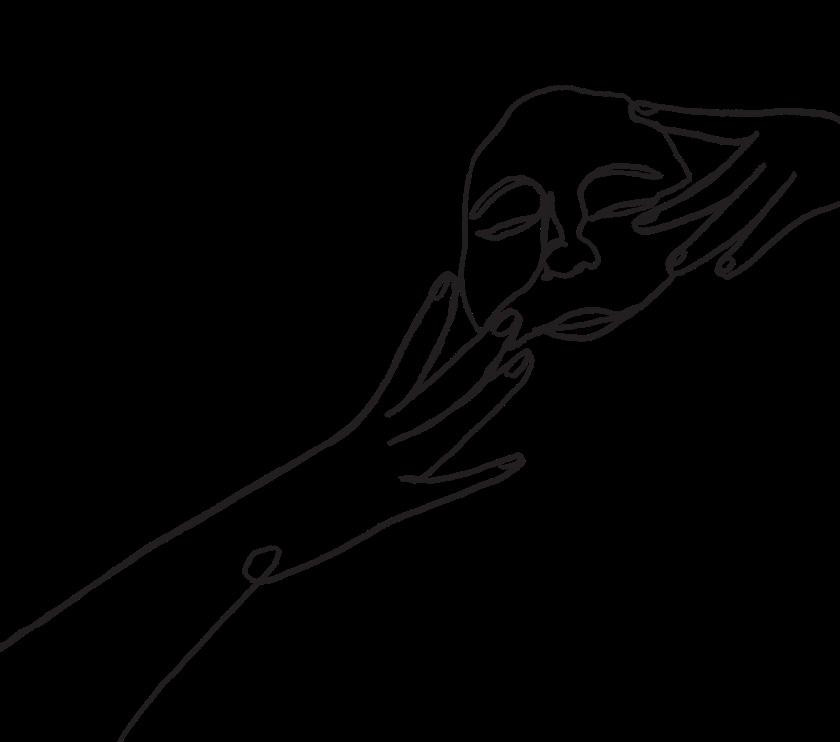
MM 11
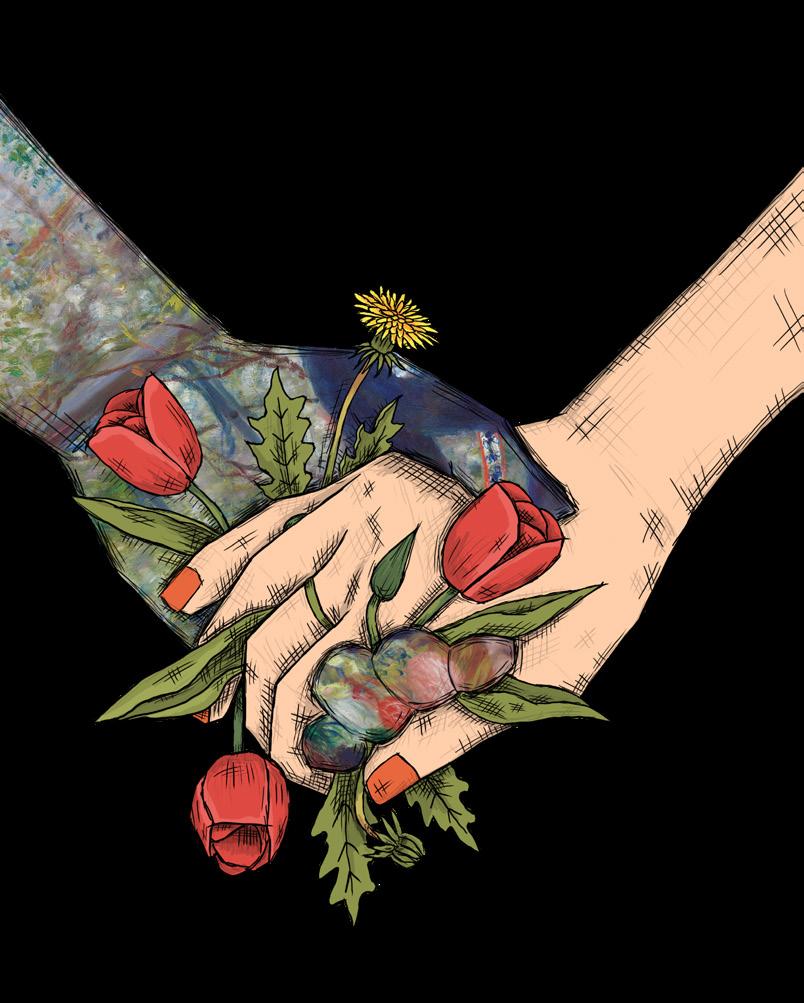
Painting Love: A Reflection on Love and Museums
Elizabeth Provost
exist not as individuals, but as threads in an interconnected web of relationships—some nourishing, others deleterious and disheartening. Every relationship has its own purpose, sometimes evident in the moment, sometimes long after you’ve removed their contact from your phone and vowed to never speak to them again. Relationships—romantic or otherwise—rely on the emotional capacity of those involved. Love is not a 9-to-5. It’s a 9-to-5 followed by a 5-to-9. When I am single, I prioritize being emotionally available to myself; that is how I heal. When in relationships, I ask myself four questions: Are you willing to be vulnerable? Are you able to be a better person tomorrow than you are today? Can you listen when you would rather speak? Will you water the flowers even if they are weeds?
Shortly before the first time I fell in love, we were standing in front of Alex Colville’s Soldier and Girl at Station. The couple was in embrace. He and I faced the painting, hand-in-hand, my thumb comfortably curled inside his palm. “He threw his bag to the side to catch her in his arms, he’s obviously arriving,” I argued, letting go of his tender grip and taking a step back for a new perspective. He argued that the soldier was leaving.
I went back to see the painting at the Art Gallery of Ontario many times during and after our relationship. It became familiar—my soldier came and left too. He was in the marines, and I was delusional. I quickly learned that love is flawed because we, as human beings, are flawed. Some flaws I’m actively working on, others I’ve accepted. For example, I enjoy taking the last piece of food on a communal appetizer plate and I fall in love too easily. Love can be a smile in the morning, an “I love you” at the end of each phone call, or a shared cup of coffee—but love is also accepting your partner’s flaws just as much as yours. I was under the impression that love was perfect. I was wrong.
Religion, ambition, distance, and timing—so far, those seem to have been the reasons I haven’t found an eternal love. Heartbreak forced me to realize that we
Before all else, I fell in love with art in 2014 while in St. Petersburg. My mother, an artist, brought me to a painting lesson off the Avtovo metro station. This was the first day that I noticed that art had always been all around me. Coming onto the platform from the train, I faced a crystal palace. We walked around the pavilion; the ceiling of the underground station was supported by 46 columns—30 lined with marble, 16 lined with molten glass. My mother told me the station was built and decorated to commemorate the end of the German siege of Leningrad during the Second World War. It was the first station of the second operational metro system of the country. A mosaic panel titled Victory adorned the far wall. A woman and a child.
The painting instructor, Igor, asked my 13-year-old self what my favourite painting was. He told me that I would paint it. This was an easy task for the last-minute addition of a teenager who was too old to be babysat but too young to explore the city on her own. I looked over at my mother, her eyes were fixed on the unlimited supply of oil paints. In the small art studio on the third floor of a Soviet-style apartment building, the unfamiliar Russian women were busy unpacking the chocolate candies, home-made pastries, and tea they’d brought to share with others. They made sure I was fed.
The only painting I could remember was from a postcard I’d seen at a gift shop a few days before. The back read “Pierre-Auguste Renoir.” French, like my father, I
MM 13
“Will you water the flowers even if they are weeds?”
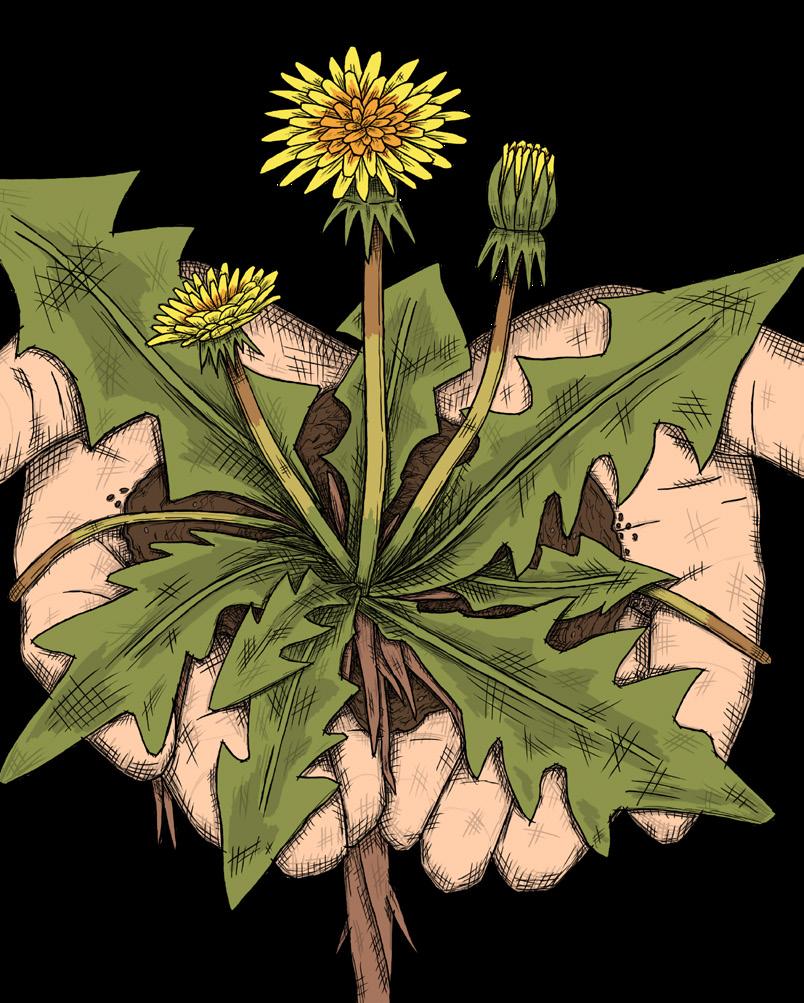
thought. Igor passed me his tablet and I searched the artist’s name. It was the first image that appeared in the results—Two Sisters (On the Terrace).

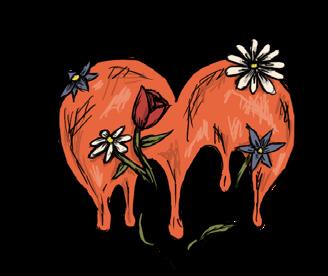
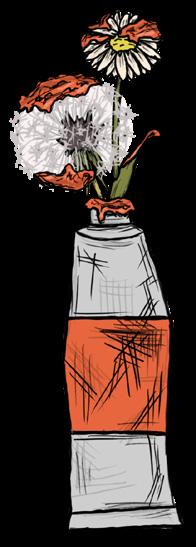
“Ah, Renoir, great choice,” Igor chirped. For the rest of the day, he spoke the artist’s name like one does to a baby, over-enunciating the vowels in a higher pitched, diminutive voice and smiling with his front teeth. “Renoir-chick,” he called him. He treated me with care, as if his own child was finally discovering the magnificence of the passion he loved deeply. He was delicate, both with the master’s piece and with my poor rendition. The picture was patient with him, and he was patient with it. I didn’t know you could love and respect art. Nor did I know that love was an art either; one that could also be learned, taught, and experienced with time. I would soon know this too.
I had never liked art museums before. In each new city we visited, my mother would bring me to these large, bright buildings with confusing floor plans. I always carried the map. When I was ten years old, she dragged me to the basement of the Hermitage. As we scurried past crowds of tourists with cameras bearing elongated lenses, she kept looking back at me, my hand in hers, saying “I’m going to show you Rembrandt, just you wait.” I stood next to her as she contemplated The Return of the Prodigal Son. I tugged at her pant leg, wanting to leave. She tried
to explain the painting before us. The son kneeled at his father’s feet in repentance, pleading for forgiveness.
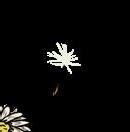


In my formative years, my mother endeavored to edify me with art; I, rather, was interested in eating gelato and building sandcastles. After my lesson with Igor, art became a material and medium with which to think, affording new octaves, new registers. The paintings and sculptures that drew my eye weren’t the ones that made it onto postcards—although those showed me beauty in all its forms; rather, I became captivated by art’s power to repair and resist.
Understanding art relies on an ability to be open and enter and engage in conversation. I asked Georgiana Uhlyarik, curator of Canadian art at the Art Gallery of Ontario, what role museums play in making art active in society. She answered, “Art is part of everybody’s daily life—whether they know it or recognize it or not.” The soft patterns of paws in fresh snow, the geometry of street signs, the varied textures of asphalt, and the lattes at your favourite coffee shop. Toronto’s Victorian homes, billboards, engines, and people coming together. The human body, bread, love, sex, and tears.
Uhlyarik recalled art movements at the turn of the twentieth century that worked to break down the hierarchies between textile work, furniture, painting, fashion, and ceramics, rather defining visual expression and art as a “communal and fundamental way of communicating that is preverbal.”
MM 15
“I became captivated by art’s power to repair and resist.”
Museums are still trying to disrupt these outdated orders by acknowledging that the rest of the world does not exist in hierarchies as we traditionally understand them—nor is society framed only in a white, Eurocentric moulding, she shared. “The future is, at least, the aspiration is, to create very welcoming, very active, very socially engaged spaces, but also to continue to be a space of communion.”
In The Future of Museums, Gerald Bast, rector of the University of Applied Arts Vienna, outlined that futurists argue that museums are cemeteries to which we take a pilgrimage once a year at most. They also argue that the fate of museum objects is akin to that of wild animals transported to the zoo. Bast explained this by comparing the reactions of an elderly couple with that of a child when presented with Baroque art. The Massacre of the Innocents by Peter Paul Rubens at the Art Gallery of Ontario depicts the execution of all male children in the vicinity of Bethlehem under the order of Herod the Great. Bast posed that with sight of such a painting, the elderly couple will admire the aesthetic beauty of the bare bodies and the technical perfection of the artist’s work, while the child, frightened, will want to leave the gallery upon spotting tied, bloodied, gagged, green-faced babies scattered across the canvas. Ruben’s intent was neither of those outcomes—the painting was completed as a reflection on the massacres taking place in Antwerp, Belgium during the Dutch Revolt. It was meant to elicit dread, acting as a weapon of counter-reformation.
In the text, Bast asked: “Why are the visitors in a museum generally left alone with the superficial aesthetic effect of an artwork? Why is

art in the museum so rarely experienced as an analysis of life reality and so rarely seen as a contribution to the development of social ideas?” Museums are moving to reframe our experiences to address these questions.
“What is great about a museum, in addition to getting to see the art, is that it’s a very contemplative space.” As a philosopher, Diana Raffman, a professor at the University of Toronto, deems the museum to be a natural space that simulates an experience akin to doing philosophy. The sensory, perceptual modality of art—one that doesn’t exist in literature, for example—places us in dialogue with the artist.
In my opinion, what art, especially good art, asks of us, is a response. It draws us in, connecting us to its fibres, its material, its composition, and its subject. It asks us to inquire about what we see—to ask questions and to seek answers. Of course, acknowledging how well one paints, the history of a piece, and its provenance can allow us to determine its value, but for me, the value lies in the response. Does the piece move me? How does it move me? Why does it move me? Raffman explained to me that the purpose of an artistic image is “not simply to prompt action, or to communicate a message, or to be a beautiful object, or to be aesthetically apprehensible;” rather, art pushes us into this “other” space where instead of acting, we contemplate.
The importance of humans and art across generations has been mutually inclusive—one does not exist, nor can it be valued, without the other. We have left our marks on caves, placed script on paper, and laid brushstrokes on canvas to show the life we have borne. Art is a mirror in which we have revealed
our turmoil and our grief in painted faces and sculpted bodies—sometimes appearing tenderly, sometimes grotesquely. Art captures what is fleeting, making us feel alive despite being stains and fading letters in the library of history. Art is beauty, and beauty is the antidote to our suffering.
The last time I visited my father in Montreal, we attended the Museum of Fine Arts. We walked through the exhibits slowly. I savoured the rare moments I shared with him, and the rare moments I shared with art. The museum didn’t feel like a cemetery, more like an eternal field of blooming tulips in the spring. I returned to it because it made me feel alive, injecting meaning and light into my veins. With each visit, even standing at the feet of the same works of art, I found new understanding. What was unclear—love, loss, sadness— became clear. The museum became my playground and my teacher.
The star exhibit at the Museum of Fine Arts was Nicolas Party’s—a contemporary Swiss visual artist—“L’heure Mauve (Mauve twilight).” The installation presented the indivisible unity of humans and nature in a colourful meditation. Party’s watercolours, pastels, and sculptures were set against works from the museum’s collection. The exhibit’s title referenced Ozias Leduc’s oil painting of oak branches fallen in the snow. In the winter scene, a purple glow reflects off the white landscape, set in the transitory moment between day and evening. It reminded me of the leap from action to acceptance—when the body and mind welcome the result. When the self acknowledges that what is meant to be isn’t always what is wanted. When I finally let go of the hope that what once was will come back.
My father was once a director, strengthening his love for the arts in visits to art museums. He and I shared a few breaths in front of Leduc’s L’heure Mauve. The artist’s
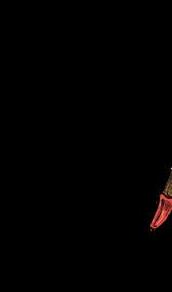
16 MEDIUM MAGAZINE
name felt familiar, I told him. He reminded me of his documentary on Leduc—one of Quebec’s first Symbolist painters of portraits, landscapes, still lifes, and decorator of churches—he’d shown me a few months prior. I knew very little of what my father did, but then I knew a little more. In her work Collecting Piece II, Japanese multimedia artist Yoko Ono wrote, “Break a contemporary museum into pieces with the means you have chosen. Collect the pieces and put it together with glue.” That day at the museum, I did just that—I broke the exhibit down and glued it with the slivers of what I knew about my father. The picture was now different.
To love my father meant to engage with him. To give into his flaws, his imperfections, his demands, and to remember that he is human. To answer his emails and to show up at his door. In his book The Art of Loving, German psychologist Erich Fromm wrote, “Love is an activity, not a passive affect; it is a ‘standing in,’ not a ‘falling for.’ In the most general way, the active character of love can be described by stating that love is primarily giving, not receiving.” We often worry about how to be loved, or how to be lovable, rather than choosing to learn how to love. Love is not easy—it does not come without fail or effort. It can feel effortless—that is good— but it requires effort. Ultimately, love is a choice. It’s easy to love when the sun is shining, but real love involves bringing an umbrella when it rains.
There are very few lived experiences that start with tremendous hope and prospect, yet fail so regularly, as love. Overcoming the failure of love involves realizing that love is an art that can be learned and nurtured with time and experience. Van Gogh once said, “I feel that there is nothing more truly artistic than to love people.” That may be why most impactful artworks are about love, in one way or another. It is also why the recipe for loving one person will not be the same as for loving another, or for loving that same person tomorrow. Van Gogh’s oil paints were predictable—he knew how the colours would behave when he used certain brushes or painted on certain canvases. But
people are imperfect and unpredictable, so loving them is a far greater endeavour than painting.
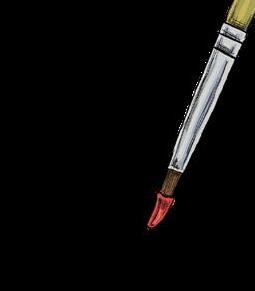

I’ve learned that understanding art and love in the modern day requires letting go of the conventions of both. Boundaries, limits, and expectations cannot be set; love and art are boundless. They exist beyond our capabilities and even our understanding of them. In many ways, love will always be passion, strength, care, and beauty. Art will continue to be a love letter through colours, pictures, and lines. The familiar memory of sending an image across the ocean with a “This made me think of you” was a love letter, revealed in the way the brush strokes touched the canvas, immortalizing that which I could not explain with words.
In his 1991 memoir-in-essays, Close to the Knives, American artist and activist David Wojnarowicz details his story in fragmented acts and sights. The final essay, “The Suicide of a Guy Who Once Built an Elaborate Shrine Over a Mouse Hole,” retells the life of a friend through interviews of mutual acquaintances. The essay is a meditation on death, and art’s ability to speak on the artist’s behalf. Wojnarowicz struggles to reach a conclusion; he fears that his own death will silence his voice. “I am glad I am alive to witness these things; giving words to this life of sensations is a relief. Smell the flowers while you can,” he ends. Smelling the flowers means finding the courage to commit to pleasure despite the forces competing for our health and for our love. It’s realizing that the only way forward, is through. With courage, with care, with passion, and with love.
MM 17
“Boundaries, limits, and expectations cannot be set; love and art are boundless.”
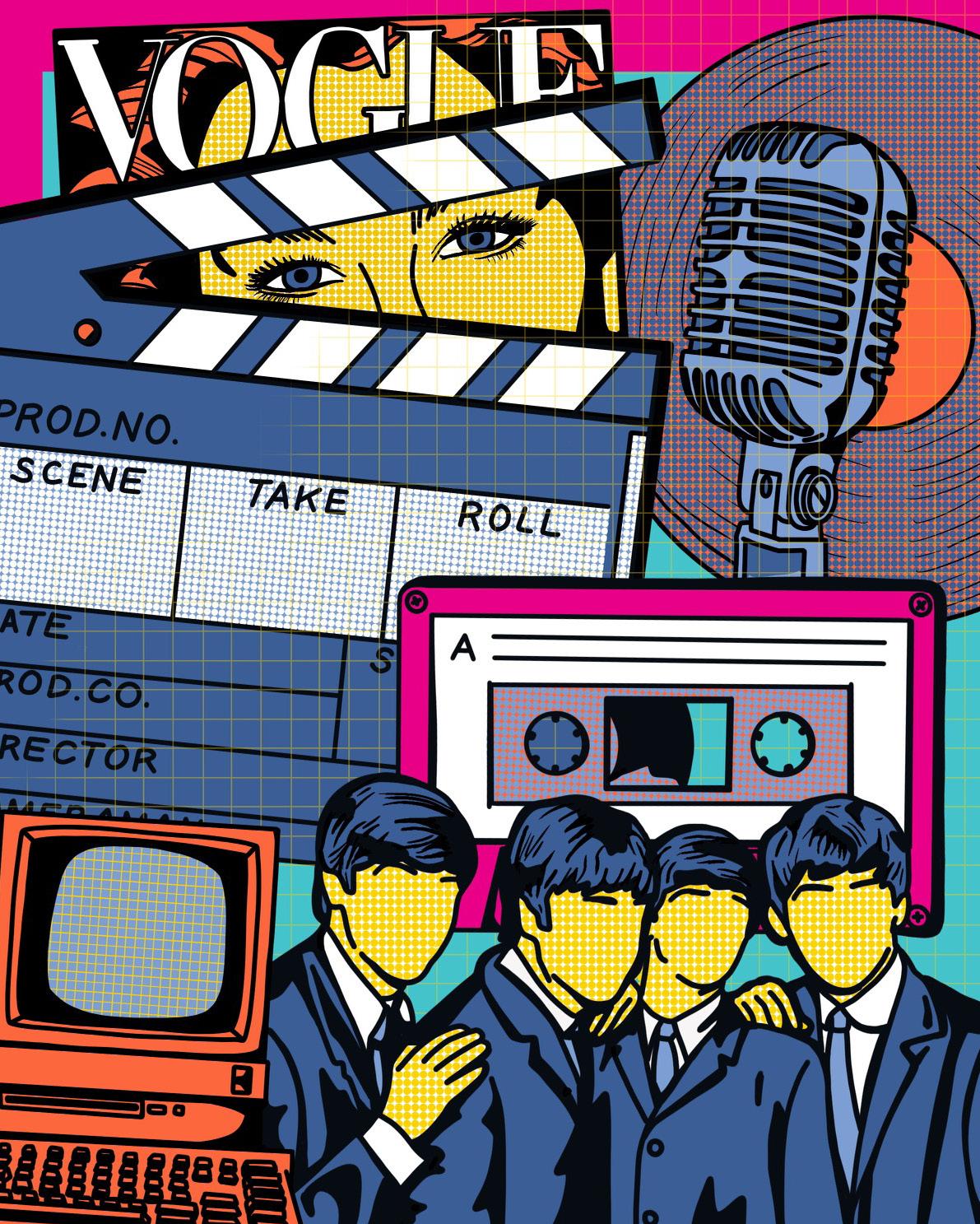
Pop Culture is Dead—But It’s Probably for the Best
Aidan Thompson
No modern band receives more undivided praise than The Beatles did in the 1960s. No fashion trend decorates the current cultural landscape like hairspray and high-waisted jeans did in the 1980s. No music genre dominates popular interest like rock ‘n’ roll did in the 1970s. In fact, even trying to define a genre now is a chore that generally provokes more arguments than agreements. Today, trends disappear from popular discourse as quickly as they arrive, often leaving no lasting cultural impact beyond mere entertainment. Pop culture is in a crisis, but should we mourn its dissolution or celebrate it?
As Marcel Danesi, a professor of semiotics at the University of Toronto, explains in his book, Popular Culture: Introductory Perspectives: “Whereas once a single style or genre dominated, today, everything from rock and jazz to classical and gospel have
their own niche audiences, each with [their] own recording artists, radio stations, websites, [and] accompanying fan blogs.” The same is true for almost every creative discipline. The internet diversified popular media. But is this a modern phenomenon or did the internet just help to pronounce and legitimize existing diversities in individual interests?
We remember the culture of the 1960s as radically bohemian and drug-inspired, but yet this cultural movement to “turn on, tune in, and drop out,” was predominantly representative of educated, middle-class youth in the Western world. It’s important to realize that although it would have made for engaging history classes, senior citizens weren’t abandoning nursing homes in the 1960s and retreating to communes in Southern California, just as middle-aged men in rural Texas weren’t
growing their hair out and practicing mindfulness. In other words, pop culture demands a certain generalization. Particular trends define a particular era by outweighing other less-popular ones. As a result, we marginalize certain communities and trends when we define pop culture.
But in the 21st century, the internet makes generalizing about cultural trends more complicated. Social media maintains niche fanbases that would otherwise be disconnected or overlooked. For example, in the 1970s, a dedicated fan of Captain Beefheart—an avant-garde musician and long-time friend of Frank Zappa—would have had to hang out in underground record stores or dingy concert venues in hopes of meeting someone with even a slight interest in his obscure artistry. Now they can visit www.beefheart.com and instantly connect with thousands of fellow fans. This capacity of the internet legitimizes the popularity of hundreds of overlooked artists and audiences and continues to testify for the breadth of cultural interest.
Likewise, changes in how we discover content diversified individual interests. For a long time, popular magazines, radio stations, or television shows informed people about new music, movies, or fashion trends. In this sense, media standardized content discovery; people received a lot of the same information and encountered similar trends and ideologies. This isn’t the case anymore. People don’t listen to the radio to check in with the music industry or discover a new artist; they listen
MM 19
“Pop culture is in a crisis, but should we mourn its dissolution or celebrate it?”
to the radio when they’re stuck in an Uber, or their aux cord isn’t working. Now, companies like Spotify and Netflix individualize content discovery based on a user’s unique preferences—they recommend particular artists or movies based on your digital footprint.
This intent of digital media, while slightly invasive, is of incredible value to the individual. People whose tastes don’t conform to the masses now have the freedom to explore themselves and connect with others who share their passions. If you have a credit card and some free time (or even just a willingness to venture into the seedier parts of the internet) you can watch any movie, listen to any song, or read any book, and do so without ever having to change your posture. We have the luxury of choosing what we attend to, but in consequence, the spectrum of individual interest broadens. If you want to see this reality for yourself, ask strangers what kind of music they listen to and count how many people respond with, “a little bit of everything.”
Compounded on this diversity is the advent of digital streaming and home-recording technology, which dramatically increased the amount of available content. According to Rachel Newman, the global head of editorial at Apple Music, in the 1960s, 5,000 new albums were released each year. If we leaned towards a generous estimate and assumed each album had 15 songs on it, that would mean around 75,000 songs were released in a year. Admittedly, that’s a lot. If you wanted to cover them all, you’d have to be listening to 200 songs a day. That’s 10 hours. But at an industry conference in September 2022, the CEOs for the Warner Music Group and the Universal Music Group confirmed that over 100,000
songs are uploaded to various digital streaming platforms every day. If you started listening the second you were born and took enough stimulants to give an elephant a seizure, you’d need 205 years to sample all the songs that were released in 2022.
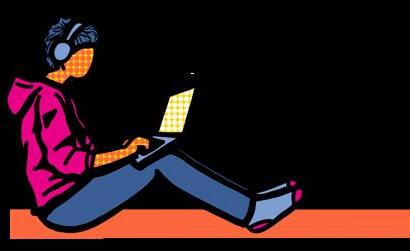
So, to recap, digital media has diversified cultural interest by individualizing content discovery and supporting niche fan bases. Simultaneously, with the advent of on-demand streaming and home-recording, the entertainment industry has become so overwhelmingly productive that trying to sort through it feels like a small battalion of 12-year-olds is throwing tabloids and vinyl records at your face as you try to browse a labyrinth of unlabeled shelves and disorganized CDs. In consequence, it’s almost impossible to get people to look at the same thing. When digital media freed creativity from the dimly-lit, windowless basement of corporate America and invited every artist with an idea and a smartphone to publish their
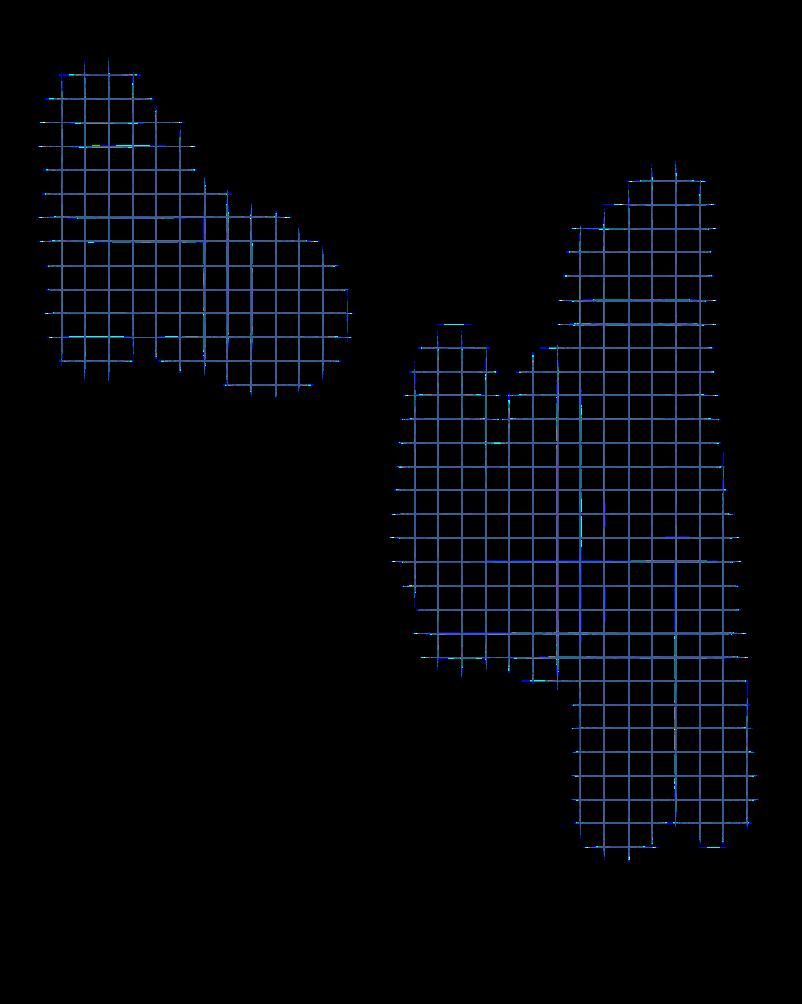
20 MEDIUM MAGAZINE
“People whose tastes don’t conform to the masses now have the freedom to explore themselves and connect with others who share their passions.”
work, the notion of collective identity—one reliant on fixed ideologies and cultural trends—disappeared.

Perhaps the only creative industry to resist this broader trend away from monoculture is Hollywood. Amidst the digital revolution, which propelled the music industry towards strange and interesting genres, Hollywood decided that the most profitable line of course was to squeeze every penny from existing cinematic franchises. By analyzing box office scores, consumer reports, and hundreds of other data sets, the entertainment industry discovered that audiences react predictably to familiar content. So, when Universal Studios is
holding a $90 million cheque and deciding whether to invest it into a period piece starring an unknown actor or an 18th Despicable Me movie, they will pick the one with an existing fan base and a predictable box office return. This is why in the last eight years, the highest charting films have almost all extended existing franchises: the top 10 highest grossing films of 2022 included four Marvel films, four blockbuster sequels, and a 14th Batman movie. Likewise, in 2014, the top 10 highest grossing films included four Marvel movies, four blockbuster sequels, and a Disney spinoff. This is why much of what is “popular” in the 21st century, particularly
in the film industry, feels distinctly un-cultural. Blockbusters are often devoid of any honest ideological convictions, instead settling for socially soluble themes and conservative characters which can peacefully exist in the lucrative middle ground of cultural interest. As analytics regulate popular media, production studios pour out generic, homogenous, profit-hungry products that lack any specific representation. With so much diversity in creative content, what appeals to the lowest common denominator becomes most popular. Hollywood’s desire to appeal to the largest audience and protect their investments regulates the industry into a predictably boring state of complacency.


This is the perfect example of why we should celebrate the passing of pop culture. Before the internet disturbed the corporate colonization of popular media, every creative industry surrendered to executive authority. As Danesi explains, “The birth of pop culture in the 1920s was made possible by a partnership that it contracted with the mass media and the business world.” Exposure on television or radio determined popularity, but those platforms were protected by industry executives. The internet changed this. Now, anyone with an internet connection and a willingness to confront culture’s worst critics can release their creative projects, and with the advent of digital platforms like TikTok, YouTube, and Spotify, have a chance at finding popularity. So, if the consequence of equality is diversity, I hope we never go back.
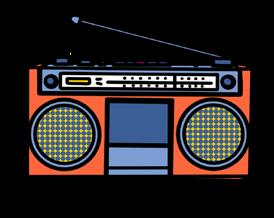
MM 21
“Before the internet disturbed the corporate colonization of popular media, every creative industry surrendered to executive authority.”
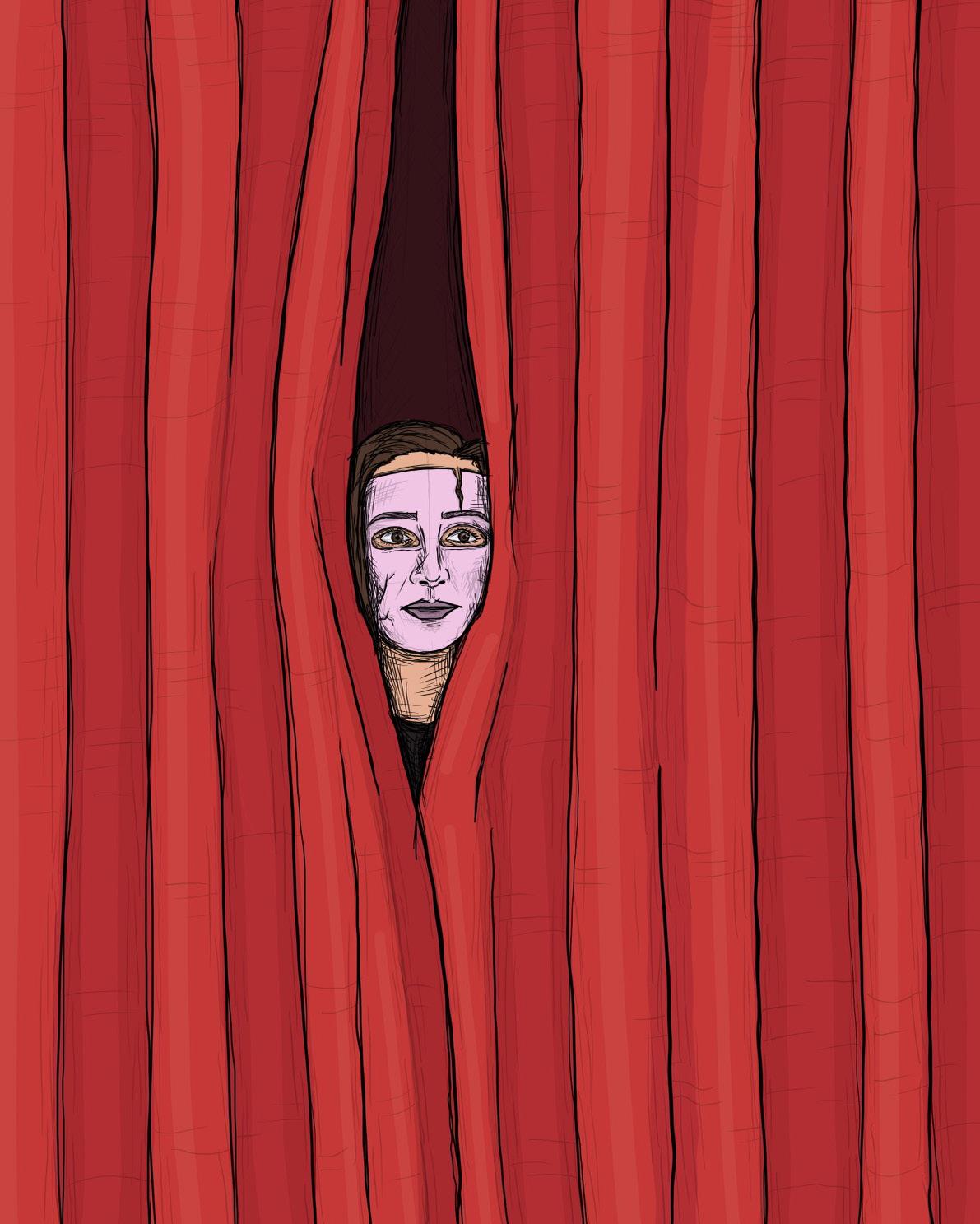
Performance Anxiety: The Pressures of Performing Queerness
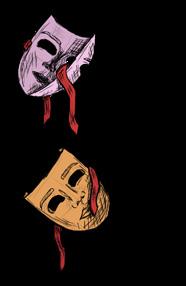
Jestina Hajjar
Performing queerness is an unending endeavour. It always seems to creep its way into my mind. It starts when I open my eyes and catch a glance at myself in the mirror and concludes with the final glimpse of my raw cuticles clutching my pillow right before my eyes shut. My life is a constant array of performances. As a queer woman, I was not given the chance or privilege to discover myself in a linear manner. Before I acknowledged my queerness, all that dwelled in my mind was confusion and placelessness. Following my sexual awakening was a flood of every version of queerness that I believed I should project. The most important thing that drowned in that flood was not my fairytale ending, not the respect of those around me, not my sense of belonging, not even my safety—it was myself.
As I discovered my identity as a queer person, the former began to consume the latter—the person I wanted to be was lost to the character I was forced to play. There was no correct way for me to express myself because the very skin I was in was a stranger to me. Queerness is deconstructing and reintroducing an image of oneself, to both you and those who perceive you, that is lost under the ill-fitting layers of straightness. Imagine yourself playing pretend, but an afternoon turns into a year, a year turns into two, and two becomes ten—suddenly, the game of pretend is all you know of yourself. The problem comes with taking the costume off and getting to know the girl behind the mask.
I presented myself in an extremely feminine manner during my teenage years. I had long hair that flowed down to the small of my back, acrylic nails, and I refused to wear any scent that could be mistaken as androgynous. During my senior prom, I wore a tight, corset-style, blush princess gown. It was so long, tight, and itchy that it prohibited me from acting in any sort of natural or comfortable way—that was what performing heterosexuality felt like. I stubbornly clung to my femininity like a person who knew they had lost a fight but refused to surrender—it was all that was left of my identity, and I had such a hard time letting it go. When I finally did, I realized that the “comfort” feminine performance provided me was not comfort at all, it was hiding, and hiding is not living.
I didn’t know how to be queer enough, feminine enough, masculine enough—I never felt like anything I did was enough. Either I presented a hyperfeminine image of myself, draped in blush and gold-specked highlight on the tip of my nose, or a masculine version, which involved an array of arrogance and confidence that I simply did not have. Queerness became another costume—it was not about who I was, but rather what I did. Because queerness, like all other things, is examined through a heteronormative lens; there is no way to be
MM 23
“Queerness became another costume— it was not about who I was, but rather what I did.”
queer—at least, not in any way that will satisfy the gaze of
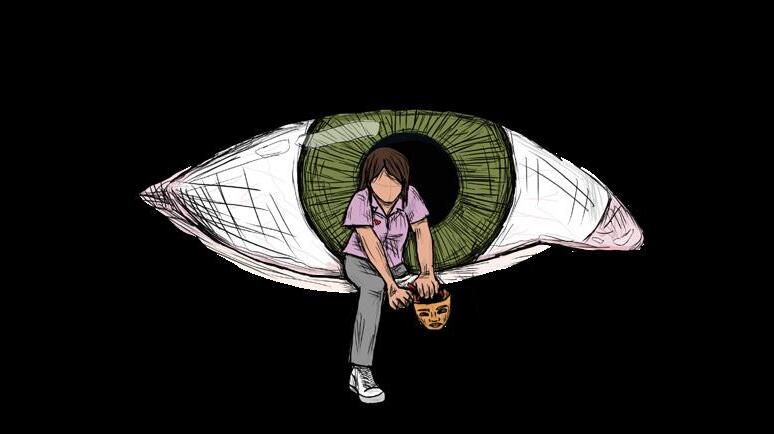
queer—at least, not in any way that will satisfy the gaze of one’s observers. Heteronormativity views queerness, specifically sapphic queerness, as one of two things: tragic or dreamlike. For queerness is not afforded the luxury of being an individualistic experience; it is instead attached to meaningless tropes and expectations. For queer people, normalcy is a dream that can only be achieved through a painful degree of denial.
I, as a queer woman, am unable to feel any sense of normalcy in romantic situations. They must involve an ounce of tragedy: a sad coming out story, a jealous ex-boyfriend, homophobic friends, homophobic parents, a love interest that struggles with compulsory heterosexuality—the list goes on. There is no room for happiness in the heteronormative depiction of queerness because it is seen as boring, without substance, and missing something—that something is a person’s impression of what queer performance must look like. However, one is not allowed to be completely happy either; if tragedizing is not present, then overly
romanticizing most definitely is. People seem to have an impression that lesbian relationships are without any sort of conflict or turmoil, as queer performance has created the idea that two women, if involved romantically, simply stare into the abyss of each other’s eyes as they discuss their birth charts and eat chocolate-covered strawberries in an open field that is rid of any bugs. Though I do know how to fill a wicker basket with French bread, jam, and various artisan cheeses, and spread a patterned blanket over a grassy knoll with a perfect view of the sunset, my relationship has conflict just like any other would. This constant clarification does not seem to stop the age old “I hate men, I wish I was a lesbian” phrase that quite literally makes me want to pluck my eyeballs out. I agree, misogyny is awful; however, as male privilege exists, as does heterosexual privilege. Queer performance not only involves the slippery slope that is finding the way queerness fits into one’s identity, but also knowing when to stop the performance altogether and begin a new one. Queer performance is far
24 MEDIUM MAGAZINE
one’s observers.”
beyond wearing Dr. Martens loafers and Dickies (though they are fundamental aspects of the practice). Not only is it a complicated process to come to terms with how I perceive myself, but also how others will perceive me. Sometimes, it is in compromising my own comfort and perception of myself that I maintain safety and security. The sadness is in that first look in the mirror after I put on an outfit. The uncertainty that comes with any choice is enough to make me want to scream. A pair of pants that falls over my legs and a shirt that makes my waist completely indiscernible from my hips. Do I look like too much of a dyke in this?
This area of performance is the most complicated of all. Do I dress masculinely and risk outing myself to the wrong people as I walk down the street? Or do I feminize myself and be forced to watch men’s vile attempts at trying to “turn me,” or worse, delegitimize my relationship by acting as if, by mere coincidence, he didn’t see her clutching my hand? Either way, performance is everything and has quite the way of making you feel like nothing all in the same shallow breath.
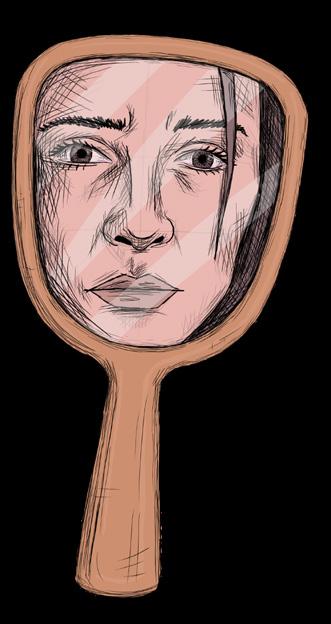
Is there a light at the end of all this? Is progress being made? I must tell myself, “Yes,” to salvage enough energy, wake up each day, and keep trying. If it means a better world for those who come after me, then I will break myself into a million pieces through performing, unperforming, and reperforming until there is nothing left. That road will be paved even if it is through our blood and tears. I can only hope that there will come a day when sexuality need not be anything beyond itself—a sexuality.
Butterflies, tears, heartbreak, shy smiles, side glances, brushes of the arm—that is all it will be. It will be nothing that requires a strong will; all one will need is an open heart, an open mind, and an open set of arms, waiting to comfort and be comforted. That is all anyone wants when we are put to rest. I just want to close the curtain, thank the audience, and send everyone home. I hope you enjoyed the show. I pray there will not be another.
MM 25
“For queer people, normalcy is a dream that can only be achieved through a painful degree of denial.”
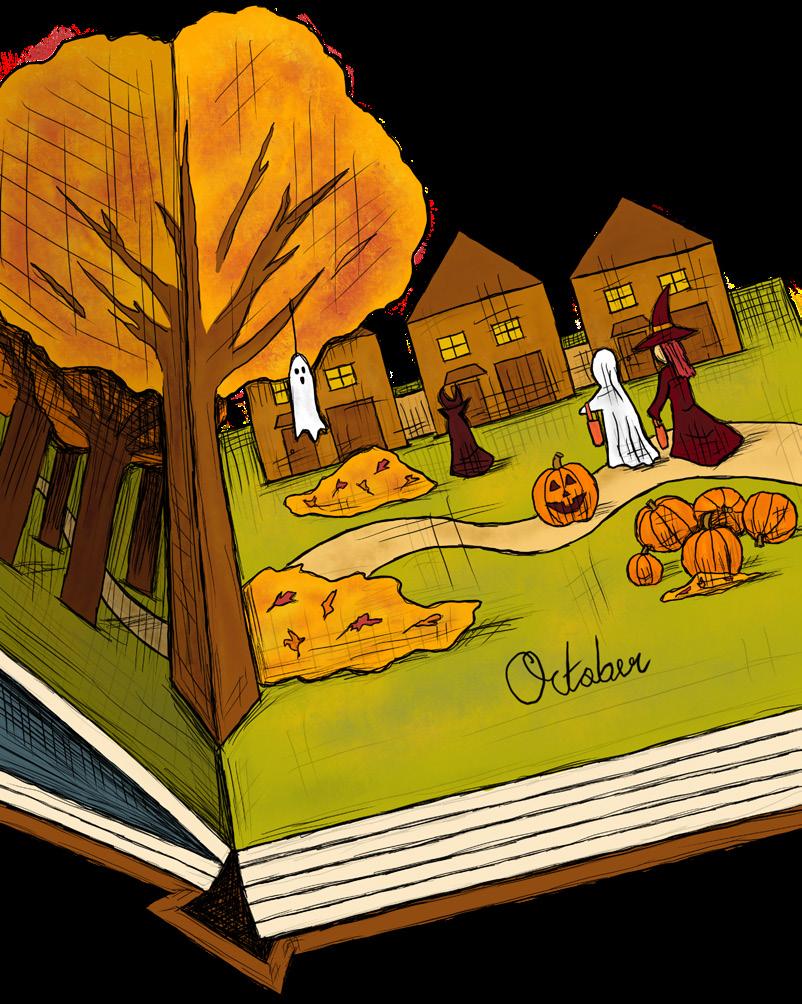
The New Meaning of Octobers
Radhia Rameez
Octobers have a new meaning for me now. I realized this when I answered “October” to a work meeting ice-breaker question, “What is your favourite month of the year?” When, I wondered afterwards, had October become my favourite month? Four years ago, Octobers, to me, meant the monsoon—cool, drizzly days interspersed with angry thundershowers, lightening splitting the sky, and rain drumming heavily against windowpanes. They meant mossy paths and paper boats and wild, verdant ferns bursting out of creviced walls. But with two annual monsoons, each of which lasted about two to three months, a rainy day was just another day, and Octobers had never been a particular favourite of mine. Here, however, in this country of four seasons, Octobers stand out. They mean trick-or-treating and picture-book trees and piles of leaves made for jumping in. They mean Halloween pop-ups and chilly breezes. Somewhere in between 2019—when I left my home in Sri Lanka—and today, I realized that Octobers had
The New Meaning of Strength
Walking away. Looking truth in the face. Feeling your feelings instead of beating them down.
Asking the questions you’re most afraid of: Is my heart safe here? Am I happy? Do I deserve this?
Realizing your worth.
Realizing your power.
changed for me. And so had several other matters—like cottages and koi ponds, black cats, and bookshops. Strength. Writing. Joy. Self-Love.
It’s an odd thing about life—as it persists, pieces within us move around, rearrange, and settle into different shapes. They shatter and coalesce. Rend and mend. Diffuse and merge. To quote a tired platitude, there is one constant of existence—change. A relentless conveyer belt of out-with-the-old, in-with-the-new. Outwith-the-old, in-with-the-new. A mantra as old as time.
The last few years have been a strange, ever-shifting time for me, with page after new page, chapter after new chapter, flicking in a high wind—the close of a five-year relationship, the move to a new country, the discovery of snow, the realization of hard truths, the beginning— and approaching end—of an undergraduate degree. In a few more years, Octobers will probably mean something else yet again. But for now, I try to come to terms with life as it is.
Realizing that closure should stem from within and not without. Putting your trust in deeds; it is easy to fall for honeyed words and flamboyant promises, harder to face the truth behind actions.
Making friends with your solitude.
Making friends with your grief.
Getting out of bed on dark, snowy days when ghosts from the past whisper and weep and weigh you down. Taking steps to heal from the staccato slaps littering your childhood like broken glass.
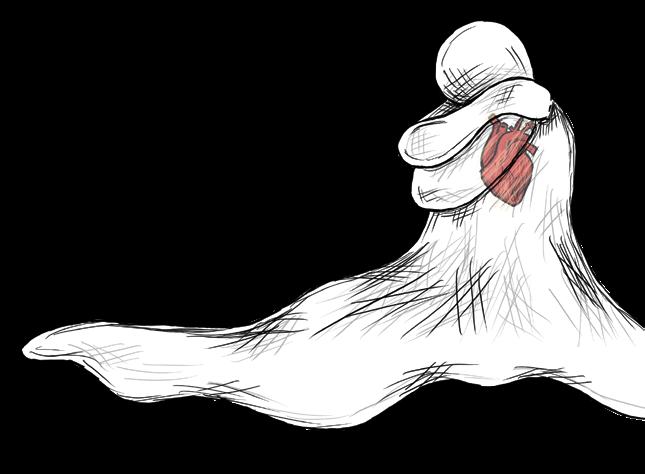
Listening to your heart.
Picking yourself up again… and again… and again.
MM 27
The New Meaning of Writing
Catharsis.
The consequence of a brief flash of a possibility; a skeleton of a story; a hint of a tune; a fleeting glimpse of poem or picture in the mundane clutter of everyday.
Running words through fingers, like sand. Turning grief into muse.
Turning joy into inspiration.
Truth-telling.
Soul-searching.
Solidifying the abstract. Making sense of heartbreak. Making sense of identity. Self-reflection.
Self-care.
The craft you turn to when something cannot be grasped or sung or painted or danced to.
The immortalization of stories.
The immortalization of truth. Truth.
The New Meaning of Joy
Dappled tree-shadows. Quiet woodland paths. Meandering creeks.
Willows weeping over still ponds.
The first crunchy leaf.
The first snowfall.
The first spring buds.
Little signs of life—
fuzzy caterpillars on stems, blue robin eggs, bright-eyed squirrels.
Pebbles on a beach, as countless as stars.
Sunny dandelions.
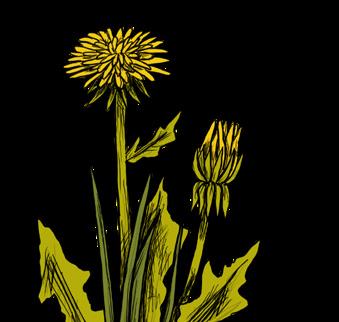
The first jacketless day of the year.
Bundles of letters tied together with a shoelace bursting with love and laughter echoing across the intervening years.
Old keepsakes breathing quietly in dusty memory boxes waiting to be stumbled upon.
The smell of new books.
Ink-spattered fingers, fine-tipped pens, and crisp paper.
The possibilities of a blank page.
The sharp edges of an A+.
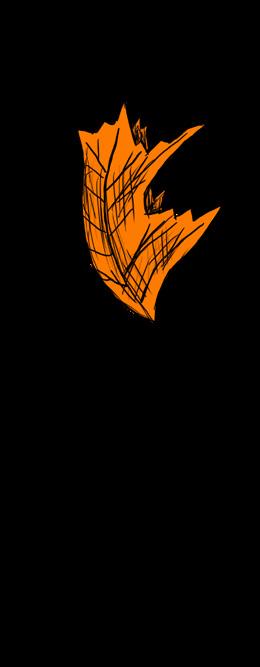
The first morning without heaviness.
The first laughter after leaving.
Relics from childhood— a little stuffed blue donkey, a tattered copy of Winnie-the-Pooh, a crude crayoned note from a once-little sibling.
Long-distance calls.
Quiet moments on a velvet prayer mat.
28 MEDIUM MAGAZINE
The New Meaning of Self-love
Nights out with new roommates. Spontaneous trips.
Affirmations: You are worthy. You are loved. You are complete. Kind conversations with yourself. Saying no.
Asking for help.
Making your bed each morning.
Acknowledging difficult days.
Acknowledging pain.
Acknowledging possibilities.
The comfort of furry blankets, hot chocolate, and dog-eared library books.
Reveling in aloneness.
Reveling in aliveness.
Building dream-towers, splendid accretions of visions and wishes and ambitions.
Scalding showers.
Warm mugs of coffee.
Balsam-scented candles and home-made face masks. Realizing you are storm and steel, ocean and inferno. Realizing you are enough.
The New Meaning of Octobers
Sunbeams and tree-shadows.
Leaves crunching underfoot.
The best time to take photographs.
The best time to take walks.
Leaves of fire and gold.
The sudden loneliness of chilly winds.
The absence of an arm around a shoulder.
Grey-skied, gloomy days, when drops of water line eaves and forlorn robins peck hopelessly for worms.
Damp asphalt reflections.
The smell of pumpkin spice.
Cuddly days and fuzzy robes.
Fingers constantly aching to curl around a hot mug.

Windblown leaves, scudding dryly along sidewalks, or swooping and swirling, redolent of dreams.

Salmon runs.
New horror movies.
The ache of missing someone.
The ache of someone faraway. New beginnings.
MM 29
Dear You, You Are Art (2/4)
Kareena Kailass
Sometimes, you will hesitate to call your art beautiful. Defining something—that in your eyes is a mess—takes more pride than you thought.
Words too are like the brushstrokes on a canvas, painting vivid portraits of the soul and the past.
In each brushstroke, you, more than anyone, will see the life and love, the grief and loss.
They will hold your free hand while you brush your teeth. They will sit in the passenger seat while you drive to school. They will flip the pages of every book you read.
Your masterpiece is a collaboration; between redefining your muse and finding yourself, you draw from the inspiration of others you seldom get to choose.
You may not want their touch on your canvas, but their mark is permanent. The most you find yourself capable of is letting the ink fade and painting over it. But sometimes, you want to be reminded of them. You wish that their touch will never wither, tracing it gently with your finger.
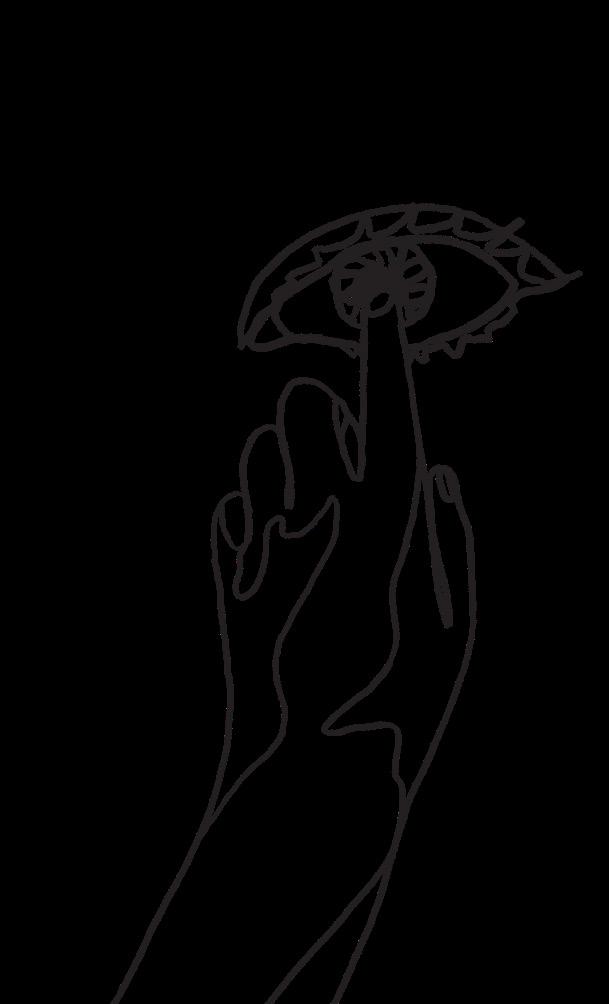
But remember, what is most important is your relationships with yourself. Allow yourself to face your reflection, define your worth, and live on your own terms. This life was made for you.
This is for all the years you did not see yourself. This is for all those years you thought you’d only be able to be happy with someone or because of someone. Now, let yourself be happy just as you are, with all of your awkwardness and differences, but never despite them.
Your piece is different each time you look at it. You’ll discover a new jagged edge you didn’t noticed before peeking through. A vibrant hue inviting your gaze. An added dimension that’s found comfort in the fibres of your canvas.
MM 31
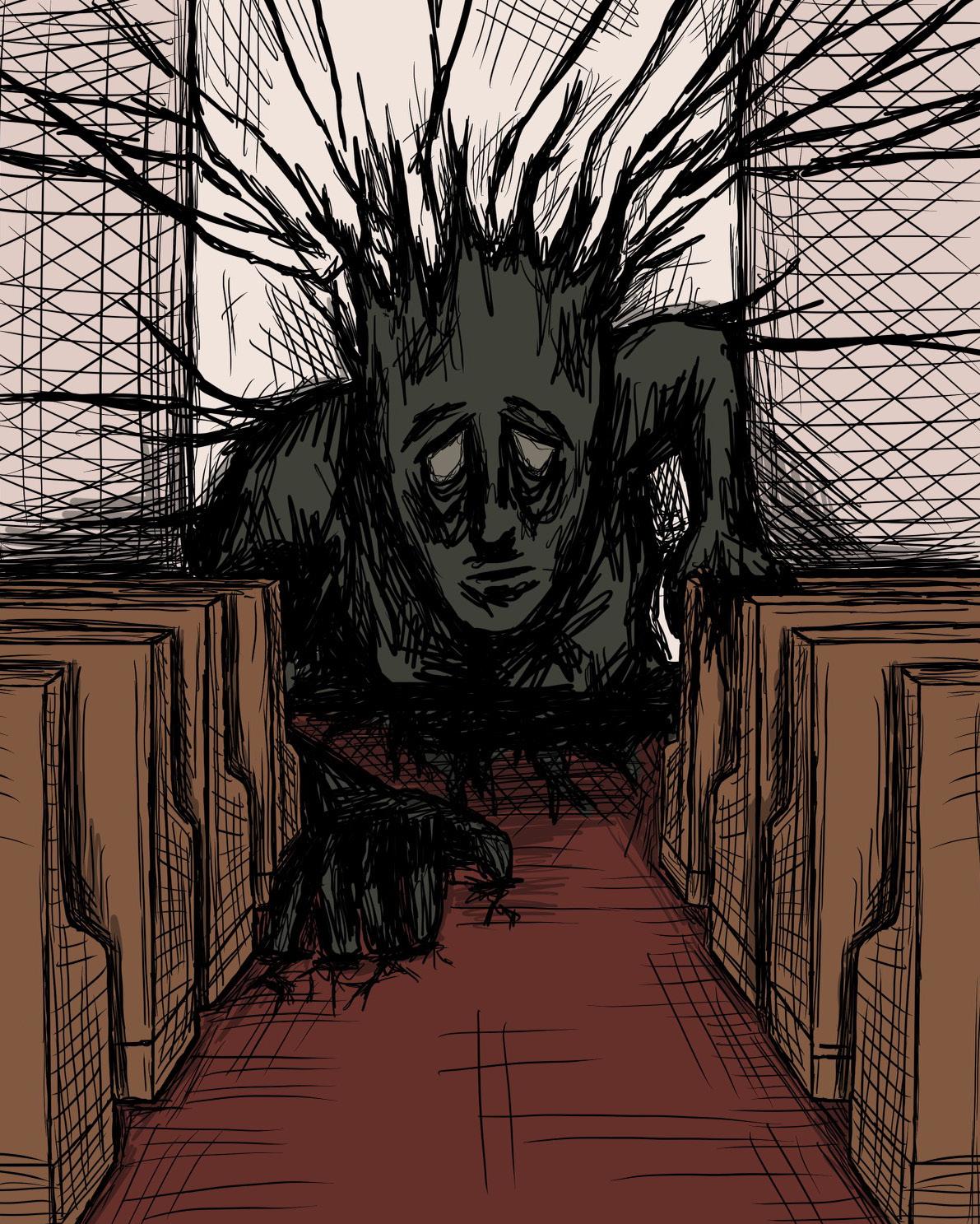
Juliana Stacey Holding Hands with Grief
Funerals have never really fazed me. From the age of eleven, I remember packing up my violin, slipping on a black dress, and marching my way over to the church. I would tune my instrument, adjust my microphone, and arrange my sheet music on the stand. My fingers would glide up and down the neck of my violin. My eyes glazed over, staring at the pages in front of me but not really digesting them. I knew every line of every piece by heart, and I had the timing of a Catholic funeral completely memorized. My cues were now instincts. I didn’t have to listen to anything that was happening. My brain chanted: You don’t know them. You’re getting paid. It’s almost over. Funerals were a job. That was that.
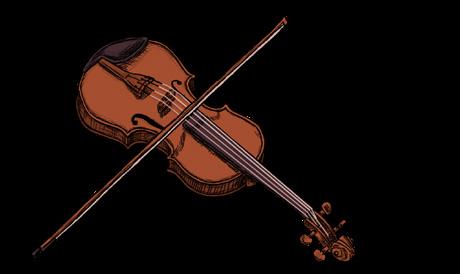
I only dreaded the ends of funerals, when the family of the deceased would gather at the back of the church in a receiving line, making it nearly impossible for me to exit the building without interacting with them. It was always the wails of the widow or the cries of the children that made my arm hair stand on edge, rather than the closed casket sitting just a few feet away. Besides, in the few times I attended the visitations, I always found that the dead radiated a sort of eerie peace, as if they were finally getting the rest they so desperately craved.
It was also helpful that I had never really come face-to-face with Grief. It lurked between the pews—you could always feel its frigid breath and beady eyes tracing the back of your neck—but in the church the creature stayed, while I went home after every service.
Though Grief did pay a brief visit to the Stacey household. In the
“My eyes glazed over, staring at the pages in front of me but not really digesting them.”
eighth grade, I lost my best friend of twelve years—my chihuahua, Chica. She was a small, peppy dog, with jet-black hair and a white stripe running down her forehead (I called it her skunk stripe). Pictures of me as a child almost always include her; from the time I was born, I had a personal security detail, except this guard occasionally took time off to unravel an entire roll of toilet paper, or to use the bathroom underneath
my parents’ bed. I went to school one day and returned to an empty crate—she didn’t make it home from the vet. Sadness seeped in and left me crying in a ball on my bathroom floor. But the next morning brought clarity: she was 16, a monumental age for any dog, and her heart was giving out. She wasn’t with us, but she also wasn’t in pain anymore. My 12-year-old brain made sense of this quickly, and the puppy we had just
MM 33
gotten was enough of a distraction from my pain. Grief’s stop on my front porch was over as rapidly as it had begun.
Grief kept to the walls of the church for a long time afterwards. I caught glimpses of its presence, shedding the occasional tear when I made unintentional eye contact with a grieving loved one. Don’t look up. But the blinders grew larger with time, and I became an expert at avoiding Grief as it stalked its way down the centre aisle, following every footstep of the deceased’s family. Just another paycheque
Grief visited my home one more time before it decided to take up permanent residence. In the summer of 2021, Mom’s father passed away after battling dementia for some time. I didn’t know him very well—Mom’s family lives in New Brunswick, so we don’t visit often. The person I knew was gone long before he passed, withered down from a man who used to build Lego houses with my brother, Alex, in the basement or wake up at 6 a.m. to work in the backyard, to a man who didn’t recognize his family’s faces. I had already made peace with his condition. I winced when family members or friends passed on condolences—they were constant reminders that I had lost someone, that everyone expected me to be in pain. You should be hurting
The day Grief came to stay was August 22, 2022. Grief called Dad during the second intermission of an Imagine
Dragons concert. He stood up, reassuring Alex and I that he would be back, and walked to the main lobby of the Rogers Centre. Alex and I joked around and took selfies—it was his first concert, and I wanted him to have pictures to look back on. I’ve deleted those pictures since.
Dad came back halfway through “Believer.” The strobe lights and smoke didn’t let me see his face clearly, but I caught a tear welling up in his left eye. I had never seen Dad cry. Years of stubbed toes and stomach surgeries barely elicited reactions, apart from scrunched-up faces and an occasional curse word. Now I watched his eyes water as Dan Reynolds jumped around the stage shirtless, singing about perseverance and hope.
We exited the building the moment the concert finished, rushed back to the car, and merged onto the highway. Dad said nothing. Alex droned on about how great the concert was. We drove home with Grief in the backseat and Dad hoping it would go unnoticed.
Dad retreated to his office in the basement as soon as we walked through the door. Alex gobbled up a couple of Eggos—the double-patty burger with a large side of fries that he devoured before the concert was apparently not enough for his 13-year-old stomach—and made his way to bed.
“What’s going on?” I asked Mom from across the kitchen table, her face buried in her phone.
“Ask your father. This isn’t for me to tell you.”
I took the basement stairs one at a time, my fingers clenching the railing. Dad was slumped over on his desk. His back vibrated with each sob. When he looked up at me, the whites of his eyes were gone, replaced by intricate pathways of angry blood vessels.
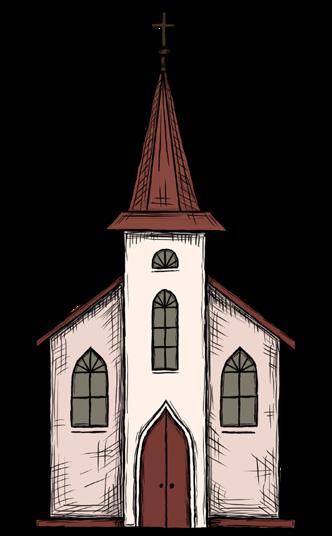
“The call was about your grandfather. He isn’t expected to make it through the night, and if he does, he’s chosen to go ahead with Medical Assistance in Dying in the morning.”
My grandfather suffered from Chronic Obstructive Pulmonary Disease (COPD) for more than 20 years.
COPD is an umbrella term for a collection of conditions that cause breathing issues— specifically chronic bronchitis and emphysema. As the disease worsens, most patients end up requiring constant oxygen therapy. There is no cure for COPD, only tools that aim to make life a little more comfortable.
34 MEDIUM MAGAZINE
“Grief kept to the walls of the church for a long time afterwards.”
Early memories of my grandfather involve spending time in his backyard, riding around the two-acre property on the back of his tractor-mower, and playing badminton, using my grandmother’s clothesline as our net. As his COPD progressed, my grandfather’s lung function dwindled. The oxygen tank appeared when I started elementary school. At first, my grandfather only used the tank when he had to leave the house, although it was recommended that he used his oxygen at home as well. He always said that the hose got in the way; he didn’t want a leash holding him back. My grandfather never lived tethered to the rules or recommendations of others.
By the summer of 2022, my grandfather could no longer walk from the living room to the kitchen—20 steps—without needing 20 minutes to catch his breath. His oxygen machine was replaced, with his new machine providing double the oxygen saturation of the last. His lungs reached critically low levels of function and sent him into frequent breathing attacks, where his chest filled with thick mucus, and he would sputter and wheeze and gasp for air.
He slept for more than 18 hours a day, waking up only to eat small meals and go back to sleep again.
There was no quality to the life he was living. He was forced to watch his body fail while his mind remained crisp. He only felt pain.
We left early the next morning. Dad and I quickly packed a few days worth of clothes, then began the four-hour drive to my grandparents’ home just outside of Sudbury. Grief was folded neatly in my suitcase, waiting for the right time to unzip the bag and climb onto my lap.
We arrived to find my grandfather sitting at the kitchen table, peeling a tangerine. He smiled when he saw me, and I gave him the best hug I could. Tears slipped out as I took a seat next to him.
“You don’t need to cry sweetheart. It’s okay. I just hope you understand why I’ve chosen this.” His eyes always had this magic to them—a sparkle that danced across his pupils whenever he made a joke or
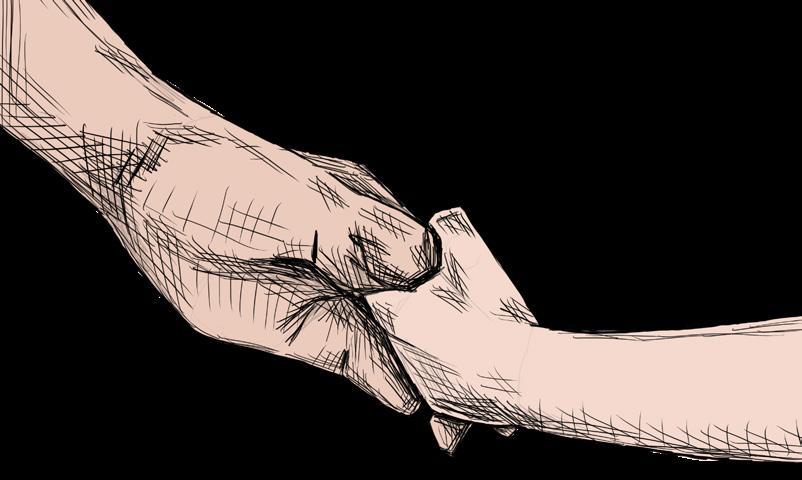
asked you if you knew a certain song (it didn’t matter if you did or not; you were about to hear it).
That sparkle was gone.
I did understand, in the adult sense of understanding things. I knew that he was in pain, that he wasn’t able to breathe, that choosing Medical Assistance in Dying would be a much more peaceful way to end his life than waking up in the middle of the night and choking to death. But the little girl who played X’s and O’s or Battleship with him at the kitchen table; who looked forward to every birthday just because he would always call and always sing “Happy Birthday,” even though he couldn’t breathe and she truly hated that song; who was always excited to tell him about the latest movie she watched or the newest album she was loving; who spent hours listening to his stories about his time as a sergeant in the Royal Canadian Air Force—that little girl didn’t want to let go.
“I do.”
MM 35
“That little girl didn’t want to let go.”
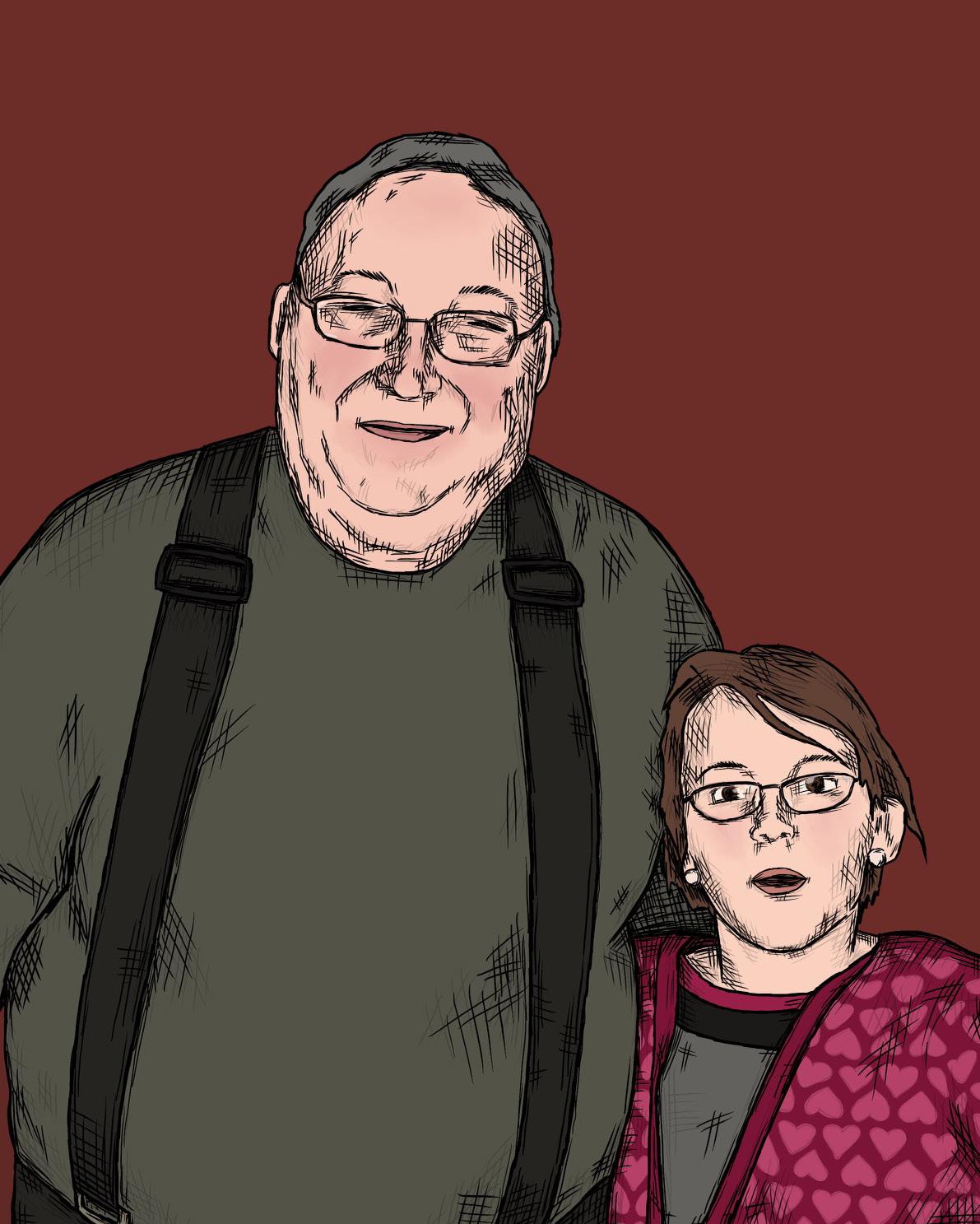
The procedure was scheduled for one week later— an expedited process, but one filled with hours of paperwork. I was asked to write the obituary ahead of time, so there was less to worry about after. I sat at the kitchen table and pulled out my laptop, looking to scrounge together something comprehensible. A blank Word document stared back at me for a long time.
My grandfather was a Not was. He’s still here. He is. He still is.
My eyes stung. I couldn’t write his obituary. Not here. Not now. Not while he was getting ready to walk over to the table and read it over my shoulder. Not while he was still cracking jokes in the other room. Not while I could still hear him laughing.
Obituaries are for the dead.
I would not write his death into existence.
On August 31, 2022, I woke up in the basement of my grandparents’ home. Sleep came in short spurts throughout the night. My grandparents’ room was directly above mine, so frantic footsteps and constant coughing kept me awake, staring at the clock on my phone, counting each minute, figuring out how long we had left.
The procedure was scheduled for 1:30 p.m. I woke up early, hoping to catch as much time with my grandfather as possible. By the time I made my way upstairs, the medications had already taken effect. My grandfather stirred in and out of consciousness, occasionally asking me to turn up the TV or telling me how much he loved us all.
I had no plans of being in the room when it happened. Dad and I had talked this through several times: we were
going to excuse ourselves and go sit in the trailer outside the house. We would not partake in the procedure.
But when the doctor arrived and the nurse showed up and everyone was trying to get everything ready, I found myself huddled in the doorway of my grandparents’ bedroom, holding Dad as tightly as I could. Grief had now checked in.
I watched the doctor explain which medications she was giving him.
“Safe journeys,” she said, then started the procedure.
I watched as his breathing slowed, then stopped.
There was no sense of peace this time. The air was empty.
I spent my 21st birthday sitting by the phone. I knew he wasn’t going to call He couldn’t call. But I still wanted him to. It wasn’t a birthday without hearing my grandfather belt “Happy Birthday” as loud as his lungs would let him. Sometimes, he would stop in the middle of a line, panting and coughing between syllables, but he never stopped singing until the song was over.
Now the song is finished. There will be no more Happy Birthdays. There will be no call on my graduation day. There will be no conversations about engagements or weddings or kids or promotions.
Instead, Grief whispers “Happy Birthday” into my ear as I blow out the candles. Grief holds my free hand as I brush my teeth. Grief sits in the passenger seat while I drive to school. Grief turns the pages of every book I read. Grief guides my fingers as I type each word on this page.
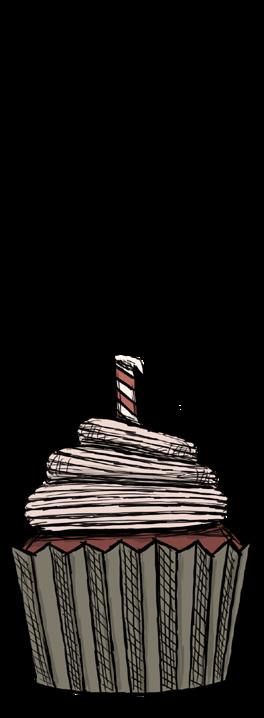
MM 37
“Grief is a part of me now. It always will be.”

Renew Through Life
Emily Rogers
Heavy footsteps fall down the hallway and stop at the end, where three closed doors lead into three bedrooms: the twins’ rooms and mine. Leaning back against my headboard in the dark, balancing a Sleepytime Tea on my closed laptop, I forgo further movement. He is standing outside my room. It’s midnight and I leave for the airport at 5 a.m. It’s his last chance to talk to me.
The tell-tale fingernail tap-ti-ti-tap-tap sounds through my wooden door, followed by a singsong “entre vous?”
Like some sort of joke, he begs entry.
“Come in,” I reply, an incorrect response to the meaning of the French phrase. Neither of us speak the language, but according to Google Translate it actually means “between you.”
My dad steps through and squeals, “Emilyyyy, you’re leaving us,” in a fake whine and plops onto my twinsized bed.
I flick on my iPhone’s flashlight to see him bare his toothy grin in the white underlighting, like a campfire storyteller.
“Yeah, I know,” I say, forcing a smile that is weak in comparison.
“Come on, aren’t you going to miss me?” He pouts down at me.
“Yeah,” I say. “Of course.”
I wait for a comment about how I’m giving him a “hard time,” but I don’t have another response stored in my back-of-head-small-talk-rolodex.
“Well,” he pats my knee through the bedsheet, causing my laptop to wobble with my tea. “I just wanted to thank you for your kind words in the car the other day.” My throat drops to my stomach. “I know that was probably hard for Ashley and Haley to hear, and, y’know, it’s a bummer we didn’t get to talk about it as a family. I’m sorry about that.”
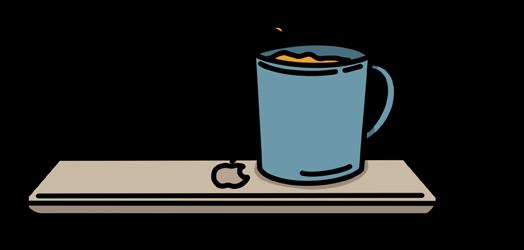
I resist the urge to dig my nails into the cavern between my shoulder and collarbone and tear off the skin in frustration. He’s wrong in so many ways.
By “the other day,” he meant Christmas Day. The twins and I spent Christmas Eve, the Norwegian Christmas celebration, with my mom at her twin sister’s house, where we ate lefse and sushi, and cookies with coffee.
Christmas Day was always for our dad’s parents. As usual, this year we opened excessive amounts of presents and when conversation ran dry, discussed world affairs. My dad’s sister told me I need to be more open-minded when I expressed distaste towards Joe Rogan. We laughed. Despite disagreeable politics, my family enjoyed that I talked a lot and sounded smart, which reflected nicely on them. According to my dad, though, they could do without my tattoos.
Once my sisters and I were exhausted, we got in my dad’s car to go home. While pulling out of the
MM 39
“It’s his last chance to talk to me.”
driveway, he put on a big smile and opened his pre-planned argument: “So, it isn’t often that I get the three of you alone.” My sisters, in the boot, were glad they let me sit shotgun.
“And—I wanted to discuss this as a family, but apparently Mom told you—I don’t know what her and her sister are planning, but she let you know that after the two of you graduate,” he gestured back at the twins, “she plans to move on from us.”
My sisters’ lack of response gripped the back of my shoulders.
“I just want you guys to know, I didn’t do anything wrong. Like, I didn’t cheat or anything.”
Beat of silence.
I cringed. “We know, Dad, don’t worry,” I said, now wondering why this was his first concern. “You’re still our dad and she’s still our mom. That won’t change.”

I didn’t want to affirm that he did nothing wrong, but it seemed too cruel to tell him off on Christmas.
“And I got my sixteen year chip a few days ago. I’ve gone sixteen years without any drugs or alcohol. So, I just want you guys to know you can come to me about anything,” his tune changed with a sharp left turn. Over a decade was impressive—every day was
impressive for an addict in theory. But I had been his daughter for 20 years, and I knew when he was lying.
My sisters nodded. He drifted around the roundabout onto the main road. The large country-club houses shrunk to ramblers. Twinkling lights flickered on the windowpane. The colours clashed like fireworks in my weary eyes.
“Yeah, that’s great, Dad,” I said.
“C’mon, it’s cool!” He leaned back and held up his chip over the centre compartment. “Do you guys want to hold it?”
One of the seventeen-year-old twins took it. He’d never spoken to them about this side of himself. Educating them about the risks of drugs and alcohol was my mom’s job. They shared a silent glance between one another in the rearview mirror.
“I still have the first ones you gave me,” I said blankly, providing conversational fuel.
My dad looked at me, “Wow! Oh my gosh, you remember?”
the Minneapolis Skywalk. Your arm stretched up diagonally to clutch your mom’s hand, which effortlessly dangled at your height. Her spare grip pushed a double stroller, carrying the twins. Strangers passed by and remarked, “Boy, do you have your hands full,” with friendly Midwestern smirks. Your mom, who already knew her hands were full, offered a glib nod back.
You were going to visit your dad in the hospital, and earlier you had been excited. You’d never visited anyone in the hospital. Before you left the house, your mom handed you a token to give to him, which she told you was for spending 24 hours getting better. She told you the shiny coin was special because you were going to give it to him.
She lifted you into the backseat of her minivan and told you to raise your arms in the car seat. Somewhere along the way you lost the coin. It took a few minutes before you noticed your hands were empty and remembered they shouldn’t have been. Your tummy twisted with an awful feeling.
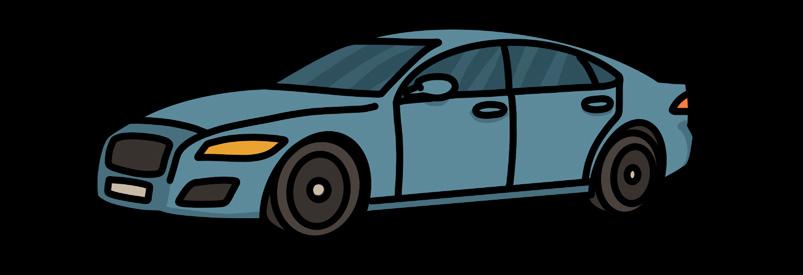
In your earliest memory, you were walking at your mom’s side, hopping building to building above streets, safe inside the warmth of
In the bright white hospital room, you held your tears in your throat, telling your dad how you were sorry you lost his coin. “It’s okay, it’s okay,” he laughed, crouched down, and slighted his fist to reveal
40 MEDIUM MAGAZINE
another token between his index and his thumb. You gasped, your awful feeling melting. He pushed it towards you, and you grabbed it with all five fingers.
“Is this a magic coin?” you asked.
Both your mom and dad chuckled and decided “Why not?” Dad said you could keep it.
There was a sentence, inscribed in all uppercase letters, popping out of the smooth surface. You touched the letters beneath your pointer-fingertip and read them out loud. “Re…new……th-RUG?” You did not know that word, but you knew the next. “Life. New life new life new life,” you repeated under your breath.
“Renew through life.” Your mom ran her fingers beneath the words, reading them out for you. You closed your fingers around the rim. Your dad placed his ginormous hand gently against your small back. Not for the last time, you felt golden.
none; you had just left your school’s social work program, where your anxiety manifested socially. The school documented your clinical lack of popularity, which was mortifying. You weren’t stupid—the claw gripping your chest wasn’t ignorable, but you were on a mission to take your shame to the grave.
The night after races, you could never sleep; endorphins kept you up. But, after killing yourself in each race, you laid in bed with your eyes shut anyway. Your little sisters tore through the house in thuds of dancing leaps and shockingly—annoyingly—talented belting. You shifted from your stomach to your side to your stomach, and the noise grew quieter, until just your parents talking in the stove-fan light remained. You heard your name and tuned in, still as a statue gathering dust. It was barely discernible, but you heard your mom suggest medication. Your dad whispered “no” much too loud, because “it’s weird.”
Without reluctance, you nodded slightly in agreement.
“It doesn’t matter,” I meet his eyes, icy-blue, swallowing his pupils in the phone flashlight’s glow. The fluffy blanket suffocates my crisscrossed legs. I wiggle my toes around beads of sweat. “We already knew.”
“But that’s the problem,” his forehead crinkles. The light from below exaggerates the shadows and highlights of his wrinkles, making me feel too young. “We didn’t get to tell you as a family.”
“No, Dad, we already knew.” He scrunches his eyelids, but I keep my best poker face. I feel like an RPG protagonist and “force kindness” or “monotone” are the only options dangling above my head. I normally choose the former, but now I’m tired and have a flight the next morning and we’re sitting on my childhood bed in my childhood bedroom and it’s midnight, my alone time. “Before Mom told us, we knew. We’re fine with it. We don’t care.”
Years later, the echoes of middle school gossip and coaches shouting “On the thirty!” slipped out of your reality when you plunged, streamlined, through the greenblue pool water. You discovered by honing endurance that your pain became currency transferable for pride. Swimming felt like the closest to flying a girl could get.
Every once in a while, though, you remembered it’s much closer to drowning. This thought emerged when you hit the cool water at the Minnesota State Swimming Competition. You were just sitting on the bleachers, watching your scrawny figure windmill its arms stupidly. The summer sun glinted blindingly on the surface. You choked, and when your head breached the surface at the backstroke bars, you heard the pity clap.
On the car ride home, your mom tried to talk to you about your anxiety. You, however, claimed to have
MM 41
“You discovered by honing endurance that your pain became currency transferable for pride.”
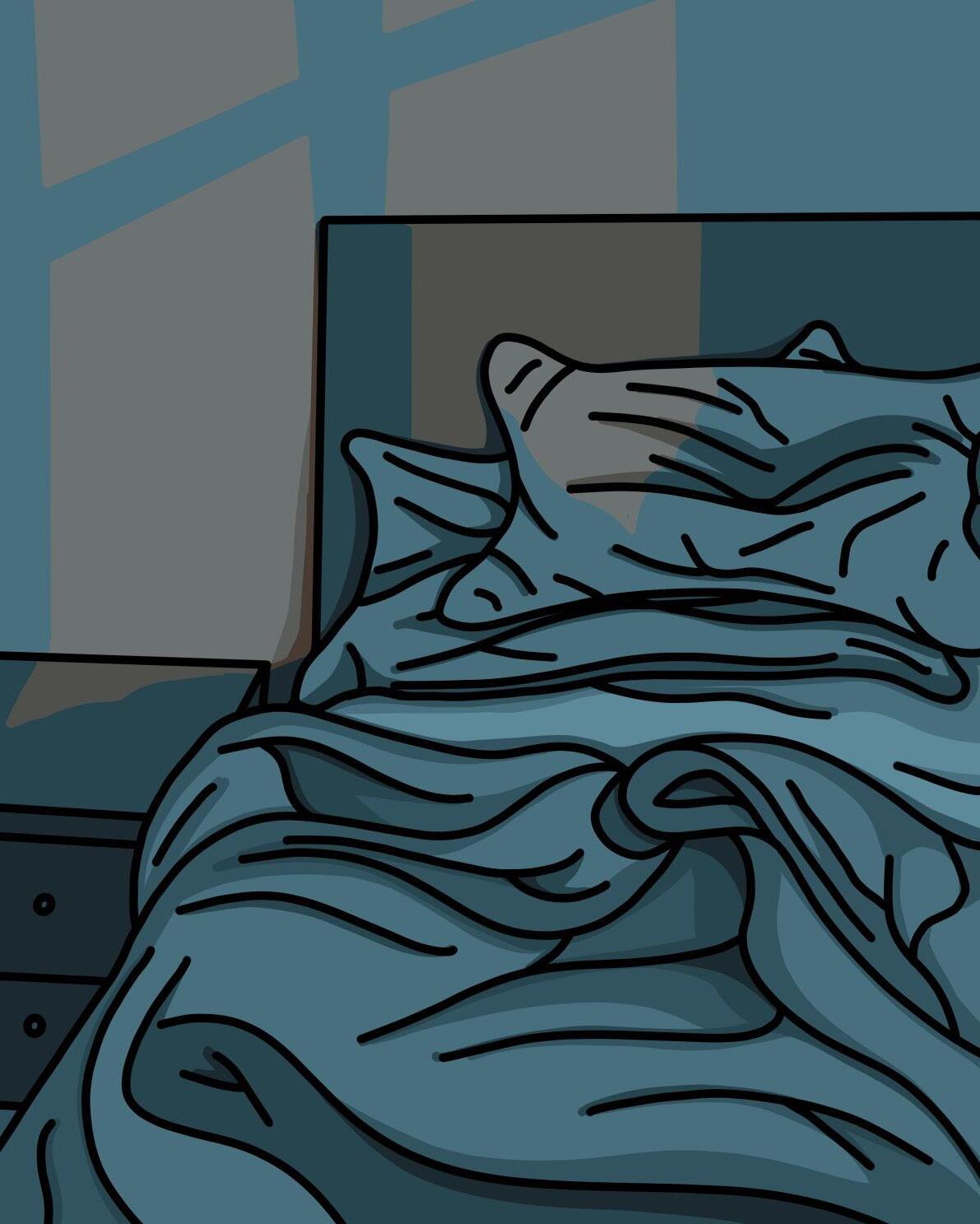
You spend high school in bed, growing stale. It was a shame that no one liked you, but you wanted to be alone. “I want to be alone,” you screamed again, most often following a terse “get out of my room.”
The mirror was your greatest source of pain. At the sight of your face, that petrifying pain swelled your tongue. Your body turned to stone. You could only stare into your cold icy-blues in disbelief that you were you. Repulsive you. You were ugly and vain for caring about it and selfish for indulging in such vanity.
You remembered a child-psychologist, back in grade school, calling you “well-intentioned”: what people say when you’ve done something wrong. You laid awake on popcorn crumbs, keenly aware of the MacBook slumbering at your side. You opened up for no one, except for solitude. Her, you treated like a house guest. You conversed with her for hours, pacing up and down your room. The stream of consciousness eroded all your poise, and the stone of your statuesque persona ground to a pebble, whisked up in the rapids. For dinner, you offered her your pain for free.
Inside your drawer, in a shiny purple box, you hid your blade under your dad’s old coins. He didn’t remember them, and they gave you no comfort, so what were they even for now?
“But it wasn’t fair to me,” Dad whines, the same way I used to when I was a little kid. The typical response, of course, was that “life’s not fair.” I hated to hear this but couldn’t argue.
“I don’t care,” I say. My limbs shake, sweat pooling under my arms. I long for five minutes ago—for comfort.
He frowns deeply. “I care.”
It strikes me that this is the first time I’ve told him how I feel. Then, it strikes me that he’s never asked. He’s never asked the twins, who still live under the same roof. My blood runs fast, hard, almost painful. Begging for freedom I won’t grant.
“But I don’t.”
“Oh,” he says.
The conversation is over.
He replasters his grin. “Well, it was sooooo great having you home, Em!” and pulls me into an awkward hug. “I’ll miss you so much. Okay, goodnight.”
“Goodnight.”
He waves with a whole flat hand, not dropping his bared teeth until the door fully shuts behind him.
I touch my phone to turn off the torch. My room is
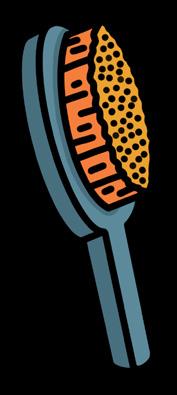
cloaked in a dark grey, not quite black to my now adjusted eyes. My rabbit heart pumps like it’s on the clock, over and over. Eyes shut, head on my arm, knees curled up, I go through the steps of sleep. For five hours, I lie awake, tired, and sweating. I want to get up to distract myself but can’t. I have to wake up early for my flight. I can’t risk sleeping in.
My mom, my best friend in my emerging adulthood, comes into my room at five, like I asked her to the night before. She brings me an espresso in a cute little cup. Wordlessly, the two of us putz around the house, handing hairbrushes and utensils to each other intuitively.
She drives me to the airport in the dark. She’s already started her day, but to me it’s just a late night. On the radio, a Christian pop group sings a ballad. Mom lets out a breathy nasal sigh, a habit that always makes me squirm in the passenger seat. It feels uncomfortably cliché: the stoic mother listens to worship songs while the melodramatic daughter sulks in resentment. My mom and I are supposed to be different.
“I have depression,” I say factually, running my nail along the plastic interior panel. “But I am happy, like right now. But I always have it.”
“Totally,” she smirks, keeping her eyes on the road. “It’s stupid that people expect people’s lives to be perfect for them to be happy. You know what I mean?”
She always ends statements with that question, and I always answer “yeah” because she’s never wrong. But, if anyone deserves a perfect life, it’s her. If addicts get a new life, a renewed life, why can’t she? After decades of fixing our messes, winning bread, and making mortgage payments, the praises others sing for her never seem to materialize.
I tell her about Dad coming into my room hours before. She snorts and rolls her eyes, saying he does that on purpose, starting serious conversations when you’re relaxed, your guard unwound. So he can stay in control. So he only has to reveal what he wants to.
“It’s just like when he made amends to me,” she elaborates. “All he said was ‘I was wrong.’ That’s it.”
She’s always keeping everything together and being told she’s amazing for it, but no one, not even her partner, ever lets her be human. She might not be “an addict,” but she still deserves a break.
“Things are looking up,” Mom tells me. “Let’s not think about it anymore.”
“Agreed, no more thinking,” I say—because I’m a liar, I guess.
MM 43

I Am Not My Sister’s Mother
Rola Fawzy
March 2021
I did not want to be in the emergency room of Trillium Hospital, but I had to be.
Hand in hand, Haidi and I entered the waiting area. I had already told her of the Covid-19 protocols; I asked her to sanitize her hands, draped a mask on her face, and answered the hospital’s questionnaire on her behalf. Mom trailed behind— close enough to intervene if needed, far enough to keep Haidi at ease.
Haidi scanned the room, then quietly stated A’yza chocolata (“I want chocolate”), as she headed towards a vacant seat by the vending machine.
“Dooda, wouldn’t it be better to sit over there?” I gestured to the reception desk. She wouldn’t budge. I didn’t have her attention; songs from her favourite Spotify playlist blasted through her headphones.
“Dooda, Dooda,” I repeated, hoping to catch her attention, but her expression remained vacant. “I’m going to check us in. I will speak with a nurse for a few minutes. Please stay here. Please don’t speak to anyone until I’m back. Listen to your music.” I repeated my instructions again. I hoped that she would follow.
I shuffled to the front desk. My eyes did a three-step dance: nurse, Haidi, exit door. Nurse, Haidi, exit door. With every rotation completed, I found it harder to breathe.
At the desk, I handed the nurse Haidi’s health card. I confirmed my sister’s birth month and year—May 2003. The nurse did not look at me; her eyes were affixed to the form she was filling on the computer.
She shot her first question at me: “What brings you to the hospital?”
“My sister is on the spectrum. She has been having a lot of meltdowns, and we needed a psychiatrist to see her, possibly to change her medicine,” I answered.
“Are you her guardian?” Another question, spoken with disdain.
“No ma’am,” I replied, trying my best to keep my calm.
“Well, where is her mother?” The nurse retorted, finally raising her eyes to meet mine. In regular circumstances, I would bite down on my teeth so hard that they could chip. I would allow my anger to fizzle. As I stood, I did not have the energy to avenge my bruised pride. All my energy was going towards the dance that my eyes were doing.
I inhaled and allowed my eyes to soften. A tear or two emerged.
“Ma’am, her mother does not speak English. I understand that this is frustrating. But my sister just had a violent meltdown before we got here. She got physically aggressive, and she’s at risk of running away. Please, try to understand,” I pleaded, knowing that my attempt to win her over could backfire.
“Okay,” she acknowledged. “I’ll talk to the nurses and try to get someone to see her quickly.”
I returned to Haidi. I was ahead of a war I did not want to fight. I closed my eyes and tried to think of the online lectures I missed and the upcoming finals season. But instead, I found myself frantically praying that Haidi continued to be seated or, at worst, stimmed nondisruptively. I breathed what little air my lungs could ingest.
Haidi’s name was called, and I spotted a procession of blue scrubs. They steered us into a different room. They asked me questions about Haidi’s condition.
“How were the past few days?”
“When angry, how did Haidi behave?”
“What is the name and dose of her medication?”
After going through the door, Haidi slowed down. Before us were rooms that locked from the outside and had windows for onlookers to peer into. We were in the psychiatric unit. Haidi squatted down and clung onto the leg of the nurse who was peppering me with questions. The nurse froze. Haidi was trying to calm herself by moving the nurse’s leg, dragging it forward and back, forward and back. The nurse panicked, and called her male colleague, who called security. Haidi would not budge. She dug her
MM 45
“I was ahead of a war I did not want to fight.”
“Like lost children, we wailed in the hallway.”
nail into the nurse’s legs. A river of red dripped to her socks. I couldn’t breathe.
Shy from one nurse who monitored the other patients, every staff member in the unit was now trying to wrestle Haidi off the nurse’s leg. Everything and everyone before me turned into silhouettes as I hyperventilated. After some sharp breaths, my eyes focused again, and I found Haidi on a stretcher. As they pinned her down, the staff formulated a plan: they had to sedate Haidi. They communicated in sporadic bursts, knowing that Haidi’s kicks, punches, and shrieks could not afford them the luxury of uninterrupted speech anytime soon.
To prick Haidi with the sedative, the staff had to restrain her with more force. In whatever broken English she could salvage to defend her daughter, Mom shouted, “Everybody STOP! No, you can’t.” In the same instant, her eyes welled up, shooting rays of fury at every person part of this mess.
“You hurt my daughter,” she said, attempting to stop the flood of tears begging to be unleashed. She had the staff’s attention for three seconds. After the third, they gathered that the both of us had to be escorted out. The security shoved Mom and I outside the door from which we entered. Haidi screamed my name.
Like lost children, we wailed in the hallway.
June 2010
“Please, Mom. I don’t want to go to the playground with Haidi.”
We were in the bedroom that Haidi and I shared. I had unwillingly dressed myself up. The way that my tight t-shirt pressed on the knot in my stomach made me want to hurl.
“Stop whining, Rola. We have to go,” Mom replied swiftly. She continued packing a backpack with all the stuff that Haidi would need at the playground. Mom furiously rummaged through the toys to find Farafeero, Haidi’s comfort sock puppet.
My mom handed me the backpack to wear, Haidi gave me her hand to hold, and we all headed out. We left the apartment, went down the elevator, and loaded ourselves into the car. We drove to Al Ahly Sporting Club—one of few places in our area that had a playground we could go to at night.
Before we headed off, Mom reminded me of the commandments: “Don’t lose Haidi, if someone is harassing her tell them off, and don’t let her talk to anyone. And
remember to always make her run and play—wear her out so she can come back home and sleep.”
There was a time when someone else handled supervising Haidi at the playground. Ms. Ghada, Haidi’s peer support worker, took on that role when I was in the third grade. But this changed when, one day, Mom bathed Haidi and found bruises on her body. Ms. Ghada had been pinching Haidi into obeying her instructions. I never saw Ms. Ghada again, and I returned to my supervision duties.
Haidi ran into the playground. She went above the slides and under them. Then, she took interest in another seven-year-old girl that sported a Strawberry Shortcake t-shirt. She reached for her long braid as she asked her what her name was.
The seven-year-old jumped away from Haidi, shouting, enty a’bita wala eih? (“are you stupid?”)
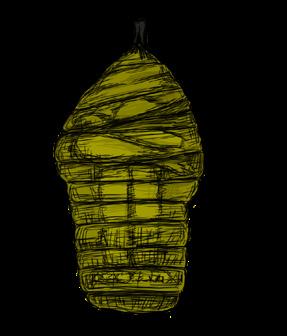
I was ready to pounce on this girl; my sister was not to be spoken to in this way. Bent enty, lemy nafsek badal malemek (“you girl, watch it before I come for you”), I said. The whites of my eyes and my clenched knuckles made her swallow her words. She found another spot to play.
“Haidi please,” I pleaded, “Can you stop talking to people? It’s just not safe.”
46 MEDIUM MAGAZINE
“But I want friends,” she begged, “I just want friends to play with.”
“I know, but you can’t have them.” I looked at Haidi, then looked at a group of cool 11-year-olds in the distance, sitting on a table opposite the playground and sipping lemonade. They wore superman shirts, pink and teal Ice-Watches on their wrists, and looked free of all care.
I wished I was sitting with them.
March 2021
After Haidi was sedated, I stayed overnight with her at the psychiatric unit. The psychiatrist on-call arrived the morning after. “I believe your sister would be better off in your care than she would be in a psychiatric ward,” she said. She referred us to a long-term psychiatrist, prescribed a sedative for Haidi, and parted ways with us.
Six weeks later, I filed petitions to defer my exams and assignments; finals season came and went. As I explained to the Office of the Registrar why I had not met
my deadlines, I felt numb and hollow. My stomach and throat pulsed, longing to relieve me from my nausea by puking. My body was so stiff that my previously relaxing meditation practice felt like prolonged bouts of sleep paralysis. My eyes begged me to intervene, even if with a few tears. I couldn’t shed any.
After I finished the petitions, I peered outside my door to see if Mom or Haidi were in the kitchen. They sat in the living room. I headed into the kitchen, grabbed a mug, and put it under the tap of running water. I could feel a headache pressing into my forehead. I knew this headache; it was the headache that came when I hadn’t eaten for a while. I couldn’t remember the last time my stomach could digest anything other than shreds of pita bread. For weeks, I couldn’t feed myself or clean my room. But I managed to keep Haidi safe until her medication worked; her violent outbursts were replaced by giddiness and keenness for life. I kept Mom safe; I ran outside to de-escalate all of my sister’s “I hate you”s before they festered into pinches and punches. But at this moment, I could not look at either of them without being engulfed in flames of rage. I’d tried to avoid this feeling in the nights I’d spent binge watching YouTube videos I did not care for. The resentment ran so deep I wanted to reduce myself to nothingness in protest.
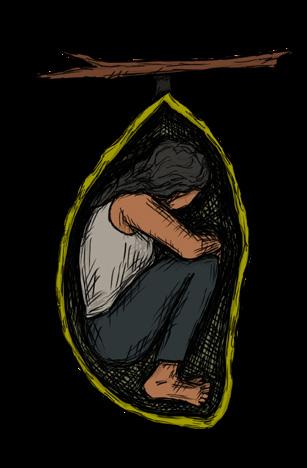
MM 47
“The resentment ran so deep I wanted to reduce myself to nothingness in protest.”
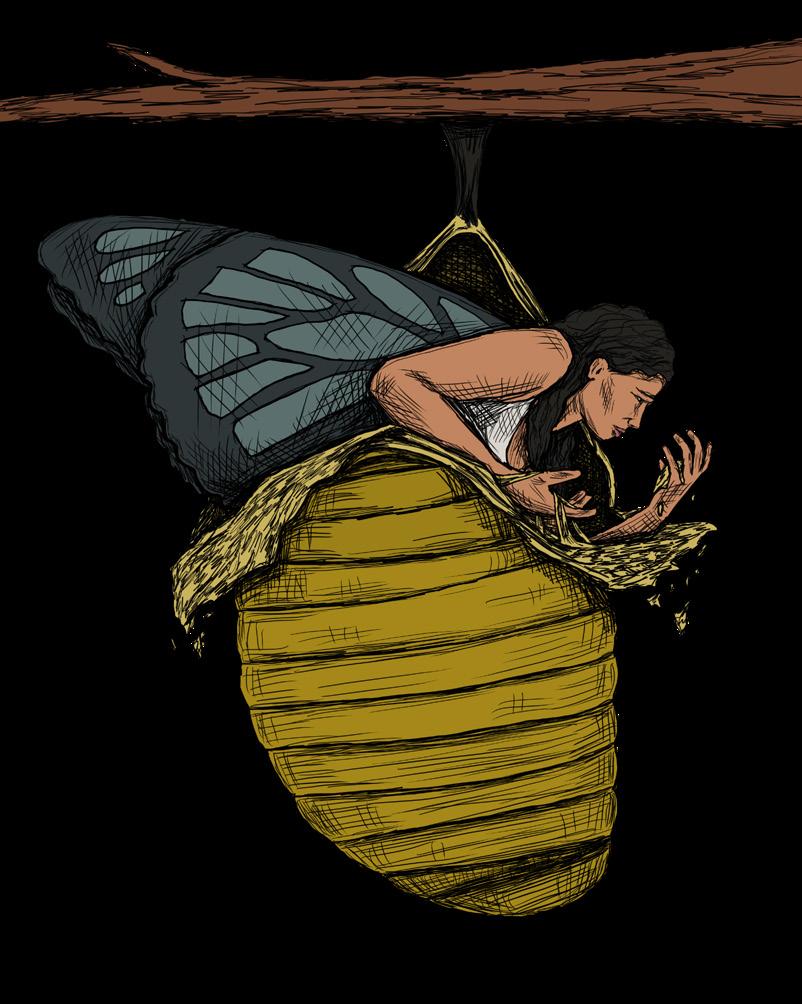
When I returned to my room, I made my decision; if I wanted to continue living, I needed to leave home. I texted a friend asking for a couch to sleep on. I packed some clothes, my laptop, and a charger into a backpack. I went out of my room to inform Mom about my decision.
“Daughter, please,” she begged, “you can’t go. You’re not in a good place.”
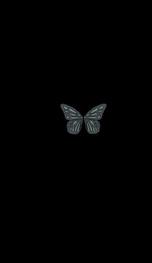
Mom begged, commanded, and persuaded. But she sensed the finality in my decision; to stay alive, I had to leave.

Then, she surprised me. “I’ll tell you what, I’ll book a room for you at the Holiday Inn for a few days. Your friend can’t care for you in this condition, believe me.”
I agreed with her terms, and we left immediately. I hoped to sneak out quietly, but Haidi stopped us.
“Rola, where are you going?” she asked.
“I need to leave, Haidi,” I replied. Usually, I would lay out a whole story to help her make sense of a radical change like this. Now, this sentence was the best I could do.
“But we are friends. Why are you leaving home?” she inquired.
“I know we are friends, Haidi. But I need to leave.”
She let me go. We drove to the Holiday Inn. Mom helped me check in at the reception. She asked if she could help me up to my room. I let out a scornful chuckle, ordered the elevator, and entered without looking back. I caught a glimpse of Mom’s reflection in
the mirror and saw defeat in her eyes; I had robbed her of a goodbye. I entered my room and finally let myself cry.
July 2022
I lie on a beach towel, looking up at the sky above. Like my thoughts, the sky is clear. I breathe in the soft summer breeze. Seagulls are flying in circles. Haidi is digging a hole in the ground beside me. After a year off, I’m enrolled in the summer semester. Haidi had been asking to go to the beach, so we decided that this Saturday was a good day to do it. I only had to think about the snacks we would eat, the sunblock we would apply, and the swimsuits we would wear.
“Rola, can you help me?” asks Haidi.
“Not before we put some sunblock on, missy,” I reply with a smile. She turns her back to me. Mom crouches to spray the cream onto her back. Not expecting how chilly the spray is, Haidi lets out a “Hey! Stop!” Mom and I giggle. We dig a hole that Haidi decides to sleep in and make a sand mermaid out of her. She is smiling. I am smiling. Mom is smiling.
“Sissy, let’s go to the sea,” says Haidi.
“Are you sure?” I ask, hesitantly.
“Yes! Let’s swim!”
I can’t remember the last time Haidi asked to go swim in the sea. The corners of my smile split wider, exposing the teeth
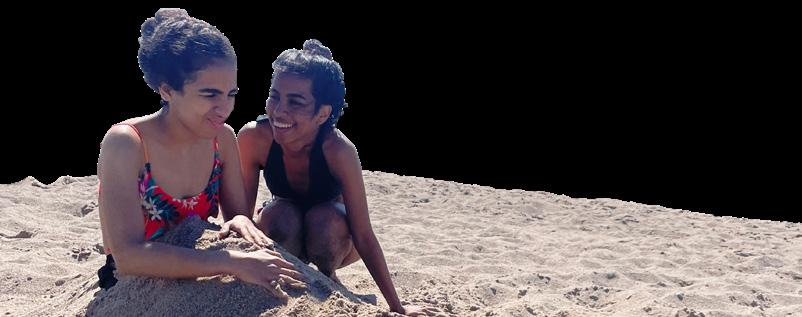
behind my lips. We dip our shins in the frigid water and realize we both made a mistake. We dash to the dry, sandy shore.
Haidi wraps herself in a towel for warmth. Three speakers blast music at the same time, and I get a little irked. But Haidi holds her own; she’s still smiling. Occasionally, she runs back and forth when the sounds are too overwhelming. But for the most part, she stays put, blanketing herself in a beach towel and a grin.
The day comes to an end. As the sun sets, we drive back home.
Haidi breaks the silence, “This was a fun day.”
“It sure was, Dooda,” I reply.
“So why don’t you guys take me out like you did today?” she asks.
“What do you mean?” I reply for clarification.
“Why is it that you don’t take me to nice places? Why are you always pulling me anytime we go out? Why did you always say no to anything I wanted?” she says, making herself clear.
Mom and I take deep breaths.
“Well Haidi, we did not know how to take care of you outside…,” answers Mom.
“You needed a little bit of extra help with some things. Which is fine, but we also needed some help with some things. So, we didn’t know how to help you the right way,” I continue.
Haidi pauses, then says, “I understand. You just didn’t know, you didn’t know.”
After another pause, she continues, “Well, now you know. Now we can be happy.”
MM 49
“Like my thoughts, the sky is clear.”
of Tomorrow
Sadly, not all seeds grow in an environment nourished by warmth and security, and when neglected, they are left to wither in the harsh winds of trauma or loss. A tiny seed of vulnerability planted during the tender years of childhood can branch out crooked and tangled, growing into a fragile tree with weak and brittle twigs. Yet, with care and attention, this tree can be nurtured and healed. This is something I’ve come to realize as I reflect on my own life experiences. As I scribble in my journal, I can’t help but wonder if my fear of abandonment stems from my childhood. Journaling has become an important tool for me to explore these difficult memories and emotions. To me, words are like the brushstrokes on a canvas, painting a vivid portrait of the soul and the past. This is when I confront those experiences, come to terms with them, and begin to forgive in order to move on and heal. It’s a process that involves digging up the hurt and anger that has already taken root in my heart, and carefully pulling out the weeds of resentment that threaten to choke me. It’s a slow, quiet practice—one that requires me to get my hands dirty, kneel down in the soil, and work tirelessly, even when I am discouraged.
But, while I continue to tend to my inner garden, I see the blossoms that bring beauty and peace to my life. Forgiving in silence is a deep act of self-care, a way of nurturing myself and the people around me. We all face our own battles, and I choose to heal despite the cause of my pain being beyond my control. The soil has remained arid for a long time, and assigning blame is futile since we cannot reverse time. Nevertheless, the focus on the canvas of the future will allow the seeds of kindness and empathy to take root and flourish. It’s a process that often goes unnoticed, but it’s also one that bears rich fruit, both in my life and in the lives of those dear to me.
As I release the scared little girl inside of me, a glimmer of hope awakens. I am reminded that there is always a chance for change and growth. The roots are untangled and straightened, finding a solid foundation in the earth. New branches get the opportunity to sprout, reaching up toward the sun, and the tree can flourish once again. It may take time and effort, but with patience and compassion, the abandoned self can grow strong and resilient, rooted deeply in the fertile soil of love and acceptance.

50 MEDIUM MAGAZINE MM 50
Samira Karimova Brushstrokes

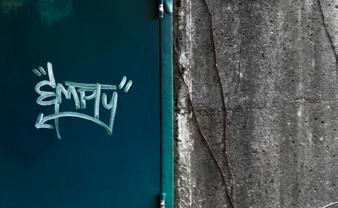
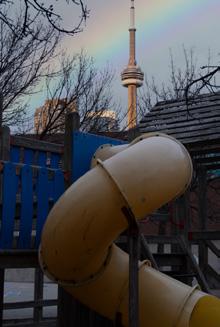

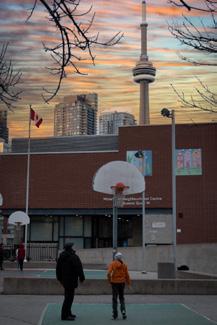

MM 51 51 MEDIUM MAGAZINE
52 MEDIUM MAGAZINE
Dear You, You Are Art (3/4)
Kareena Kailass
Eventually, you will learn to love your masterpiece for all its tattered edges. You will want the world to stand still, so you can drown yourself in the perpetual bliss of the moment.
And then, everything and everyone before you will be turned into silhouettes.
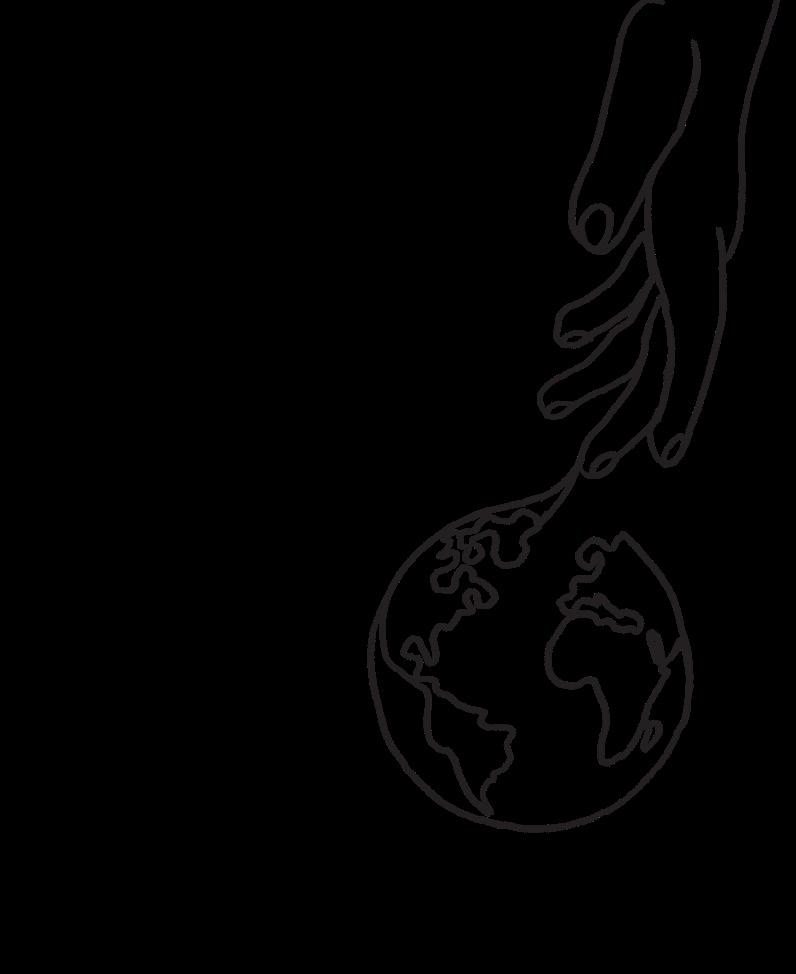
You will be swept into a world of transition. A world of being neither here, nor there, but somewhere in between. At this time, your memories will be the closest you will feel to reality as you compete against the swing of the clock’s pendulum, racing to preserve your past on your canvas before its reminders become figments of your imagination.
Allow art to capture what is fleeting, to make you feel alive despite being a stain and fading letters in the library of history. Art is beauty, and beauty is the antidote to our suffering.
And from this, you will learn that your fear of ruining your masterpiece is what will stop you from going forward. Don’t hesitate to give yourself the opportunity to move onward, even if it means shedding your old self and embodying a whole new you.
Your canvas is begging for freedom you won’t grant.
Grant it. Because learning to make the unfamiliar familiar is what will make you stronger.
Still, no matter how hard you work, how earnestly you try, how careful you are, nothing you do can prevent your work from growing. With each passing moment, you know your masterpiece will never be the same again.
And in the deepest crevices of your soul, you may be terrified. And yet, underneath a pile of uncertainty, there is curiosity.
You will find new light, even if it means walking on your own and learning to live all over again.
MM 53
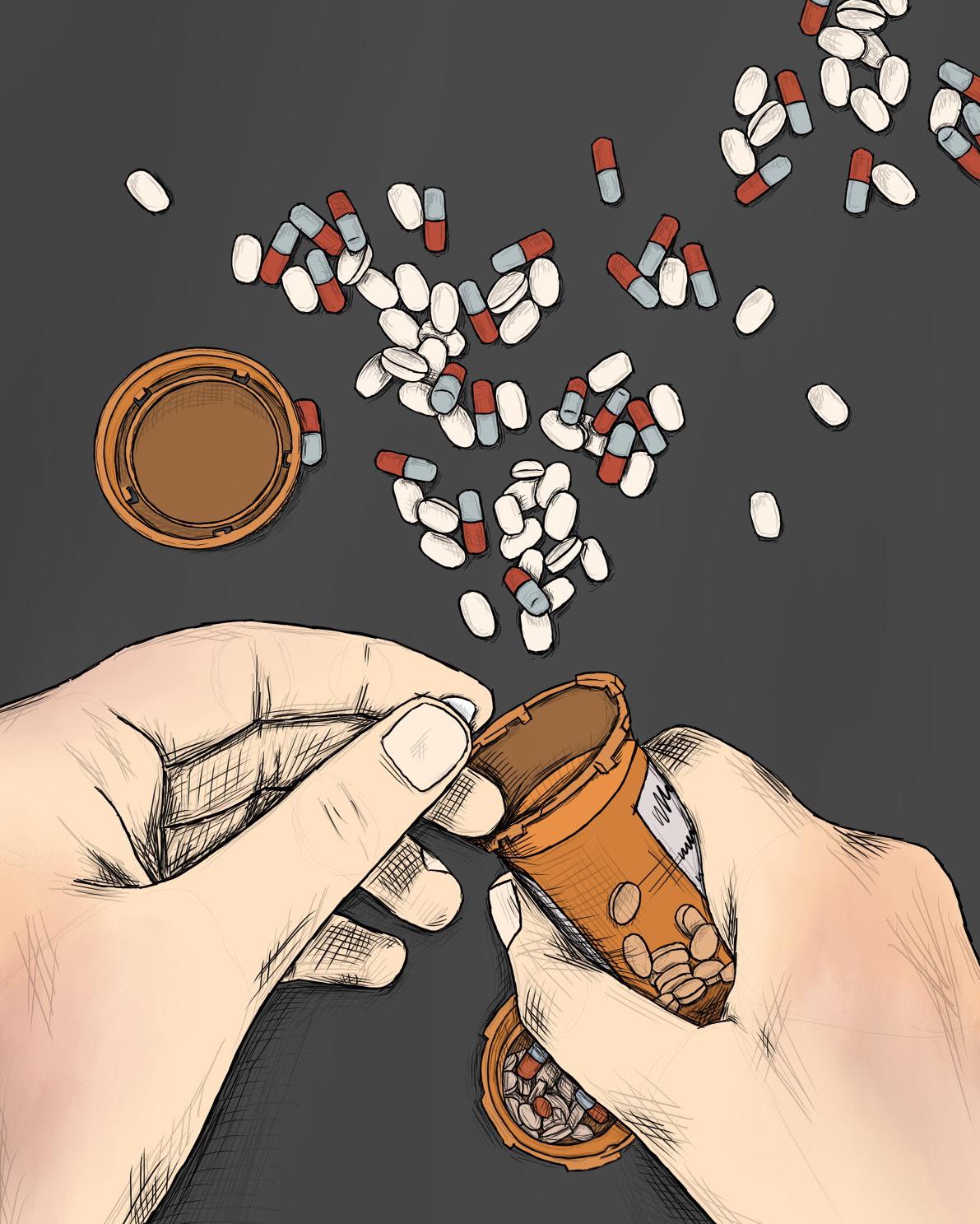
Concussions, Compulsions, and Car Crashes
River
Knott
By the time my body was thrown from the windshield and plastered to the pavement, I was already relatively confident I wasn’t dying.
Good. That’s the first step, I suppose; I’ve never done this before Gratitude for my continued existence quickly gave way to embarrassment. I must have crossed the street while the light was still red, and now everybody is screaming and wailing and crying and probably going to be late for work.
Idiot, idiot, idiot. Peel your face off the street, dummy, people have places to be.
Wait.
The walking man was still lit up in white. The walking man!
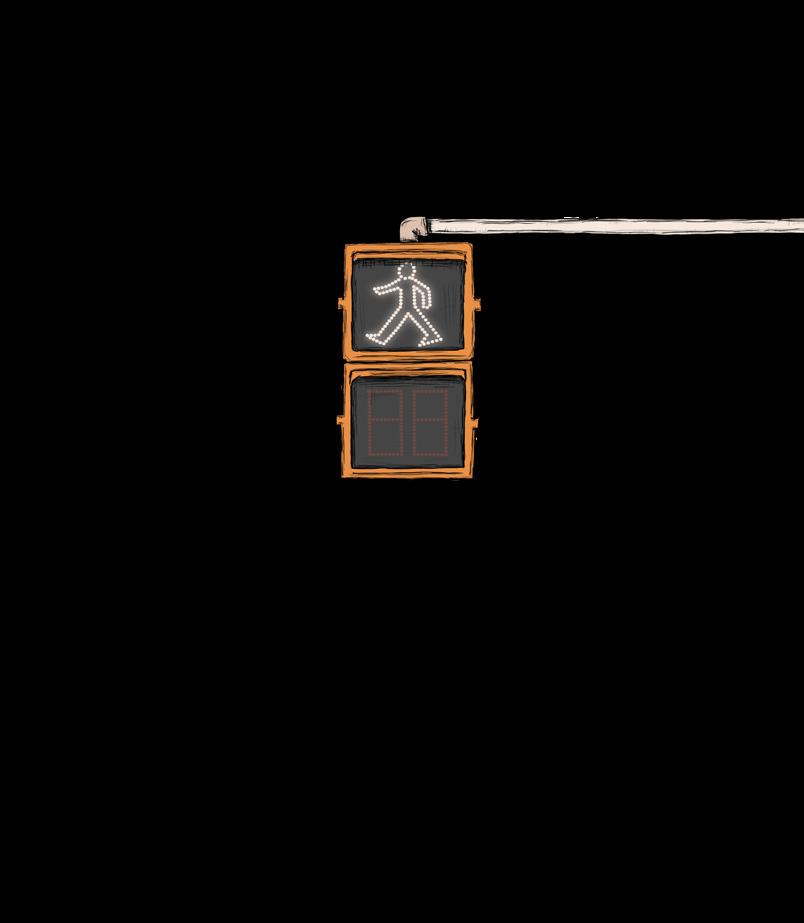
I was walking, that was for me. She wasn’t walking, she was in an SUV. The walking man is not for SUVs, it’s for people who walk. I was walking, now I am lying down. There is no lying down man lit up in white. Get off the street.
If you’ve never tried it before, lying down on a four-lane street elicits a feeling of intense wrongness. It’s like sitting down for lunch and eating a ham and peanut butter sandwich; something just isn’t right. However, if you do find yourself in either of these situations, I have found the best solution is to reflect for just a moment on the problem, and then get up and try again. With this in mind, I allowed myself, strewn across the pavement, to be flabbergasted for just a second or two before I pushed myself off the asphalt and onto my feet.
I dragged my body up off the road and found myself face-to-face with the driver—a middle-aged woman with dark hair, her face twisted by her own horror. She was screeching like an exotic bird; I didn’t make a sound. Never had I seen such an honest and powerful display of horror on a face. Somehow, I found her wailing hilarious. Her eyes popped out of her head and her screaming mouth was stretched, almost grotesquely, into a wet cavernous hole. Which one of us was more frightened by the impact? Being hit by a car is shocking, yes, but a young man with a backpack barreling onto your windshield at breakneck speed must be just as startling.
MM 55
“I have found the best solution is to reflect for just a moment on the problem, and then get up and try again.”
No longer lacquered to Lakeshore Road, a gaggle of gawking women drew together, encircling me. They ushered me over to a nearby bench. Seeing as my spine hadn’t collapsed in on itself like a telescope, I felt pretty good. I felt even better when the ladies around me started saying things like, “Thank goodness he’s so big and buff and strong. Otherwise, he could have been really hurt!” That ego boost was exactly what I needed after having been humbled by a rocketing wall of metal. Thank goodness that didn’t kill me, how humiliating that would have been: killed by a soccer mom.
Sitting quietly and waiting for the police to arrive, I wondered what one does in a moment like this. Surely, playing Candy Crush would be inappropriate. Call somebody! Yes! This would be some very important, rather disquieting news for lots of people in my life. I called my father first; I got no answer. Though, I already knew he wouldn’t pick up; he was almost certainly sleeping, as he had just finished working a night shift at the emergency room. There was no answer from my mother either, she must have been working. No answer from either of my brothers, although I think that was just due to their brotherly nature.
The funny thing about head injuries is that they tend to make you forget about getting head injuries, so when the EMTs showed up and asked me if I had hit my head, naturally, I said no. The memory of my head bouncing off the windshield would only come back to me later that night, somehow regurgitated from some deep crevasse in my brain, the quarter-second impact perfectly preserved. Oh well.
The dark-haired woman was out of her car now, her face tear-stained, struggling to catch her breath. Feeling for her, I accepted her apology. Despite the soreness starting to swell in my achy bones, I knew her day would be significantly worse than mine. Still, I felt like a dope in the grocery store who apologizes when somebody else hits them with their shopping cart (except her cart had 250 horsepower and was a sports utility vehicle). She continued to apologize for what she had done until the police arrived to force her away from me.
The authorities asked me my name and age, and when I answered, I felt shoulders relax around me at these two words: “I’m 21.” I realized then that everybody had assumed that I, a young man with a backpack, attended the local high school down the street. I would also learn that, apparently, hitting a child with an SUV yields far more punishing criminal charges than hitting an adult with an SUV. I felt strange about this at the time; being hit by a car as a 17-year-old had to hurt the same amount as being hit by a car as a 21-year-old—a whole lot.
Unfortunately, for the dark-haired woman, distracted driving yields a significant criminal charge no matter the victim’s age.
What caused me to be tossed by the car and onto the street at such an impressive distance was also, in part, what caused it to hurt as badly as it did. The car didn’t stop until a moment after I had already been hit. The woman slammed on the breaks after I had become all too familiar with her windshield, reduced to a mosquito on the headlights of a semi. Presumably, this only happened because the dark-haired woman was distracted. Although, I chose for the time being to give her the benefit of the doubt.
The police handed me a court hearing number, affirming that whatever happened to the dark-haired woman would be up to a judge. They offered me a ride home, but I declined, opting to limp back to bed.
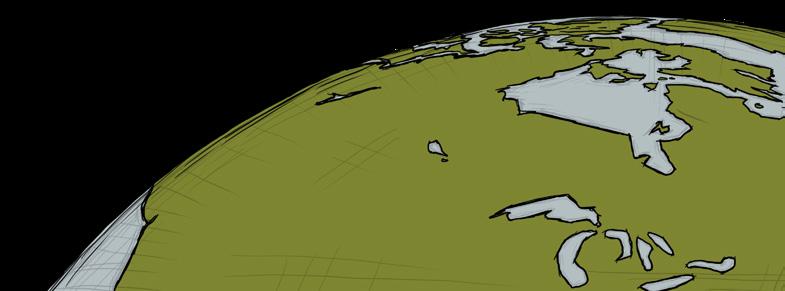
When I was 10 years old, my mother and father took me to a doctor in downtown Toronto because I couldn’t stop washing my hands. I would wash my hands when I touched something I felt was unclean. I would wash my hands when I saw something I felt was unclean. I would wash my hands when I had a thought which I felt was unclean. I would wash them all the way up to my elbows, sometimes twenty times in a row, until my knuckles bled. The broken skin felt like gloves two sizes too tight around the bones of my fingers.
The doctor told my parents I had obsessive compulsive disorder, and I started taking special medication to help. In the following years, diagnoses for generalized anxiety disorder and depression followed, and more medication came along with them. My life became a balancing act. Excess energy evolved into anxiety and panic, while allowing myself to become too tired—whether that be due to work, school, or social pressures—manifested in depressive symptoms. My equilibrium was a perfect, tiny point in this world, a flawless little box—inside, I was safe. The box was small and dark enough to coddle me through waves of chest-gripping panic, but was just large enough for me to move, circumventing the boredom that left me depressed. My box was
safe, but I never got to stretch my legs out, or see the sky. My every move was predetermined by my fabricated ideas of right and wrong, good and bad, helpful and unhelpful. These concepts were woven into my mind. Weed and alcohol were bad, never use them. High grades were good, always get them. Video games weren’t useful, don’t enjoy them. Getting a good job would be useful, so work as hard as you can to get one.
There was no time for joy, for laughter, for relaxation, or for friends. When Covid-19 emerged, my isolation only worsened under quarantine.
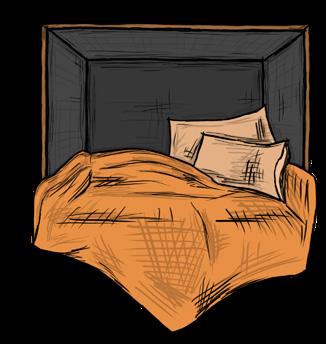
In 2020, I developed agoraphobia, a fear of the whole world and everything in it. Leaving the house frightened me, so I slowly came up with more excuses to stay inside, all alone. Eventually, the fear grew to be so intense that I could no longer continue my part-time job at a little bakery across town. I could no longer continue to do anything, except focus on my law school application, because I had convinced myself that, so long as I could become a lawyer, I would finally be free. I would have everything that I wanted, and I would finally have the confidence to explore the world like I always wanted to.
In the summer of 2022, after failing to get into any of the law schools I applied to, I felt like I was nothing. Still, I kept working. I was an undergraduate student, taking summer courses on campus, struggling every day to gather my wits enough to climb on the bus to my classes without being overcome by panic. The panic consumed everything, what was, what is, what could be, but every day I walked to the bus stop, trying, with every cell in my body, to be good, to do the right thing. Breathing deeply to relieve the anxiety, I would wait for the walking man to light up, look both ways, as was the good thing to do, and then walk across the street. No matter how hard I worked, how earnestly I tried, how careful I was, nothing I could do stopped the SUV from hitting me. In that moment, everything was thrown up into the air, me included, never to be the same again.
Back in my bedroom, I undressed to assess the damage. Nothing horrific, a bruise darkened and spread across my hip and a headache which slowly worsened. I woke my father. Worried, he touched my bruises and asked about concussion symptoms. Things seemed fine. I reflected for just a moment on what happened, chuckling at the asinine nature of the event, then I fell asleep.
The next morning, I took some ibuprofen, waited for my headache to subside, and headed for the bus stop once again. Second time is the charm. I felt a strange sense of confidence while waiting for the streetlight to change. My fear of the world had slipped away that morning, as the worst had already happened, and I had survived it. What more could the world possibly throw at me that I couldn’t handle? There was the walking man, lit up in white.
Breathing deeply, I crossed the road and sat at the bus stop. I looked up and saw the very same woman, in the very same SUV, barreling through the very same intersection, cellphone in hand, just one day after she nearly killed me. Some people never change, but now I know that I can.
MM 57
“My equilibrium was a perfect, tiny point in this world, a flawless little box—inside, I was safe.”

Mind | Body | Soul
Aia Jaber
Sitting on the floor of my room, a space that appears to have grown twice in size, I clutch my heart and wail, hoping that someone will come save me. I feel small, and the world that once seemed inviting, asking me to explore, is now shouting at me, calling me a failure and reminding me I will never be strong enough or smart enough. My cries cut through the vacant enclosure, and I pray for someone to tell me I’m doing everything right. My mind and body, connection severed, echo harsh remarks and painful rituals for several weeks. In a matter of days, my life has changed rapidly, and with it, my self-perception.
Anxiety has always been a part of who I am, but what was new was my inability to hide the pain that dimmed every light in a room. It became so agonising that I quit my jobs, my hobbies, and even my clubs to focus on my classes. After many sleepless nights, the list of activities that made me proud—from hanging out with friends to writing articles—were off my radar. Not by choice. My anxiety had stripped my accomplishments from my hands, made my revised list of achievements vacant, and crushed any hope of creating the life I dreamed of as a child—a life filled with wonder, success, and self-confidence. Maybe I wasn’t going to be a popstar or a best-selling author, but now it felt like my goal of going to grad school was gone too.
Anxiety is more than just twiddling your thumbs or being a little nervous about talking to people. It isn’t simply avoiding presentations and feeling butterflies in your stomach. It isn’t just being afraid to take a test. It isn’t just cancelling plans because people make you nervous. Anxiety is debilitating. It is an enemy hidden by the disguise of picking at your fingernails or fidgeting with your rings. It can keep you locked in your room for days, or make you terrified to go home at night and sit with your thoughts, pushing you to stay in the car for as long as you can before you are called inside. Anxiety is waking up in a panic because you know you have a whole day of responsibilities and tasks to complete.
It’s gagging at the thought of an overwhelming deadline and dealing with a burnt throat for weeks after. It’s numbness in one arm, thinking you’re about to have a heart attack. It’s physical and it’s painful. It follows you through the morning and into the night. It leeches onto you like a relentless stalker that you can’t file a restraining order against. It makes you feel lonely, forcing you to push your loved ones away because the thought of them supporting you makes you feel like a burden.
My body reacted in ways I didn’t know possible. My hands and legs would shake, and I was convinced I would fall down the stairs. My sleep was panicked, my breathing was shallow, and my dreams were filled with horror scenes in which I was in my classrooms, panicking about an assessment or a professor’s approval. My eyesight was foggy, my body hot, then cold, then hot again. It was screaming at me to stop, to give it a break, and care for the vessel that carried my soul. I couldn’t work well, or focus, or remember, or sleep, or just stop thinking. There was no “off” switch—like everyone told me there was. Every moment, for weeks, I felt sharp pains in my left arm like I was close to fainting, or to dying—like my body would give up at any moment.
Breaking down every few minutes, gripping the leg of the table as I sat sobbing, I brought anguish to my family. They were terrified, seeing me wail on the floor, asking me to be myself again. The Aia that smiled and laughed. They were right; I was losing control—with no idea as to why my mind and body felt so separated. There were moments of intense pain, and I couldn’t pinpoint what made me feel this way. It was as if my intellect had packed its belongings and called a holiday. I did not eat. I could not sleep. Within the span of three days, I had gone to the doctor twice.
In the deepest crevices of my soul, I am terrified. And yet, underneath a pile of uncertainty, there is curiosity. Terrified and curious about the future. About whether I’ll graduate in the spring. Or at all. If I’ll get into the master’s program that only takes six students. If I’ll get a good job. If I’ll find love.
In moments where my intellect fails me, I must remind myself to deconstruct my forced expectations. This is the second step to achieving inner peace—the first is to accept your state of being. Sounds like BS, I know. I am the top sceptic when it comes to such seemingly vacant advice. “Just believe in yourself” and “keep a gratitude
MM 59
“The mind can never find the solution, nor can it afford to allow you to find the solution, because it is itself an intrinsic part of the ‘problem.’”
— Eckhart Tolle in The Power of Now
journal” seem like temporary solutions for an indefinite issue. However, if I choose to acknowledge that I am on my own path, and that there is no pressure to finish university in four years or be extremely successful by the time I am 25, then I am truly able to look inward and become acquainted with my own needs and desires—untainted by the expectations of social media, or LinkedIn, or the university community.
I don’t enjoy talking about my anxiety. Partly because I haven’t fully accepted it myself—constantly arguing with my mind and body for its inability to use one of my coping mechanisms—and mostly because I hate the idea of appearing vulnerable or needy in front of people. However, during these weeks of intense solitude and panic, I searched hundreds of blog posts, TikTok videos, and YouTube clips for tricks and solutions to no longer feel, and to no longer be plagued by the inability to take a full breath of air. Most of the tips included “breathing techniques” and “meditation.” Maybe those work for some people, but they don’t work for me.
My Google search history is filled with “how to overcome anxiety” and “tips and strategies to manage anxiety.” But, to no avail, I am not “cured”—if there even is a cure. The days where I would start an essay the same day it was due are long gone, and to replace it are moments
of fear forcing me to finish assignments two weeks early. I knew that talking about my feelings had been resonating with students through my column with The Medium titled Changing Leaves—I took that as an obligation to continue to write. In my hours-long internet deep dives, all I wanted was an example of a student that felt exactly what I felt, and the tips they used to get by. Because, for a bit, all I wanted was to finish the semester and then share my experiences so that someone else might find comfort.
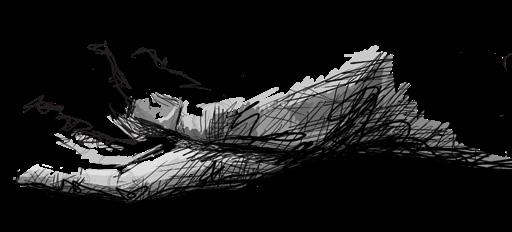
or the logic behind making tough choices fuels my acceptance of life’s challenges. However, this so-called rationality, disappeared and led to intense fear and panic. My coping mechanisms were gone, and I couldn’t pick between rationality and fear. The person I forced over the years—a hardworking, determined, capable, and logical person—was gone. She needed to be constantly reminded that she wasn’t a failure, and that she will be okay again.
Science and religion are two elements of life I find most comfortable. Understanding the science behind emotions or physical reactions,
God has always been a central part of my life—at some points more than others. My faith isn’t always consistent. But the perfect Muslim is not someone who is never wrong. We weren’t created to be infallible. The perfect Muslim, or the perfect person, is someone who tries their best. Emotional and religious
60 MEDIUM MAGAZINE
“They were right; I was losing control—with no idea as to why my mind and body felt so separated.”
development aren’t perfectly linear. As I sit down on my prayer mat, I beg God to take the pain away from me and everyone involved. In closing the gap between my Creator and I, I turned to the YouTube series “The End of Negative Suffering” by Khalil Jaffar—a major source of comfort to me. As he discusses anxiety, he explains that the only moment is the present. The past and future do not exist other than in those temporal concepts. By acknowledging that the voice in our head isn’t our true self, we can focus on what is real and tangible—the present moment.
In adopting this mindset of remaining in the present, I am aware of the terror that accompanies spending all my time worrying and missing the time I have right now. Eventually will come a phase of life where I won’t be in university, nor with my friends or with my family. Reflecting on the happy moments should come easily to me; I would hate to be unable to remember any of them. My counsellor told me to focus on what I want. To say, “I want to graduate” instead of saying, “I have to graduate.”
It’s been helping. Maybe it’s the philosophy student in me saying this, but I have free will. I can do whatever I want, theoretically. Anything I’m told not to do is dictated by society, not because I can’t do it. And so, I could just drop out and never worry about school again. This is a choice. Whether there is societal pressure doesn’t matter when considering the philosophy of free will. Transcending this mentality of “ought to” and “should have” allows me to realize I’m here by choice. You’re reading this by choice. I’m writing this by choice. I’m in school and want to graduate, and that is a choice. I want to be happy and do well in school. I want to work. I want to rest. There are consequences to all actions, good and bad, but I will act because I want to, for whatever reason.

I’ve been implementing new tactics to encourage me to fall in love with living, like doing one fun activity a week, making a bucket list, romanticising university, and honestly, it’s been working in small doses. But then I find myself sobbing for hours in my room, frustrated with myself for being unable to think right, or for accepting help from others. Even while having fun, I choose to do it as a logical way to heal. My body needs to understand how to function in the same way scientists need results to back their claim. The only way I feel peace is if I understand the causation for an event or a series of actions. I’ve had to let go of this narrow framework of thinking, and of my ego. I’ve had to accept that I’m not capable of doing a million activities at a time and keeping up with every single person to make sure they’re doing well, while doing fulltime university, and taking care of myself—even though I was once able to. Sometimes I need help. Sometimes I don’t know why I feel how I do. I cannot control everything.
Truthfully, I have no idea what the golden ticket to feeling better really is. I’m still learning, and I don’t think I’ll ever beat my anxiety until I accept that I have it. However, feeling good also comes from accepting new perspectives, tactics, and solutions. For me, goodness has come from my family, my friends, the strangers I meet in the Starbucks line, and even my philosophy professor. I have always been rational because that is the way I thought to avoid pain, but my anxiety forced me to let go of my ego, and my rationality, and accept that no solution I concoct or Google will help me feel like my old self again anytime soon. Out with the old expectations, and in with the new—new solutions, new perspectives, new self-worth, new self-perception, new self-acceptance. My goal in my early 20s is to be kinder to myself, and to change my perspective on where I am in life. To not rush myself or feel like a failure. Although moments of goodness have been replaced with hours of pain, my goal is to experience goodness and pain, but understand that the bad is not a testimony of idleness in life.
You can do muscle relaxation therapy, change your mindset, say positive affirmations, go to the gym, read scientific articles to relieve your anxiety, but sometimes there’s nothing permanent you can do until you find rainbows more than thunderstorms. The temporary helps in the moment to make the day easier, but the most logical way to get through the anxiety is to face it until you make it through the storm—at least, that is my opinion. Maybe there are ways to combat anxiety, but to do so, you need to create new strategies and mindsets. Anxiety requires you to adapt because it’s going to come back. Maybe you live in a constant state of April, or England, where it just pours every day, but holding onto yourself while the thunderstorm rages is your best way to make it to the rainbow. We need to hope to keep moving forward.
MM 61
“We need to hope to keep moving forward.”

Love Me, Love Me Not
Olga Fedossenko
I sneak out of the classroom minutes before my English class. I sprint to the girls’ bathroom, turning off the light as I stumble in. I wince at the sight of my reflection in the mirror. The bathroom window lets in the dim January sun, my face is bright white in the winter light.
I move closer to the mirror. The redness of my inflated skin is peeking through a thick layer of foundation. I move a strand of hair away from my eyes and accidentally brush over a new spot inflamed in red I found on my forehead this morning. Sharp pain pierces through my face and I flinch,
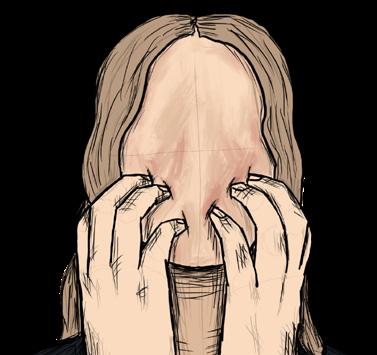
trying to use my hands as a fan as if my pimple is an open wound.
I continue to examine my face, grazing it barely with my fingers. The powder is smeared in the spots where the infection is causing purulent acne clusters. Even my aunt’s new Clinique concealer, that I stole from her makeup bag this morning, does not have enough pigment to cover the raging blemishes around my mouth and below my cheekbones. The layers of makeup are suffocating my skin. Through the slit of the washroom door, I notice my friends disappearing from the hall and into the classrooms. Suddenly, I hear somebody’s steps approaching. I rip out the last paper
towel from the dispenser and pat my oily skin with my trembling fingers.
Someone pushes the door open, and my eyes meet my friend Zhaniya’s concerned expression.
“You coming?” she asks, still standing in the doorway.
“I hate myself today,” I let out a sigh.
“No-o. Please, don’t say that. I like how you look.”
“Let’s just go.”
I force a smile. Before I step out of the washroom, Zhaniya turns the light on and walks in to check herself in the mirror.
As soon as the cool light hits my face, I gasp. Now, I can see the cracks on my lips from months of taking Accutane—medication used to treat severe cystic acne and prevent skin cancer—the scars on my cheeks that never recovered from deep-seated inflammation, and the smudged concealer on the bumps from pimples around my chin and on the sides of my face.
I rush out of the washroom before my eyes start watering.
“We should go,” I tell Zhaniya, walking out before she can notice my tainted smile.
Halfway down the hall, I let my friend walk ahead and stop for a second before going into the classroom already filled with people.
So this is how my classmates see my face every day?
Is this why boys in my class do not find me attractive?
Are they disgusted because I am too?
I walk in and sit in a chair beside one of the boys in my class. I scoot my chair away from him—that way he cannot see the spots on my left side,
MM 63 13
“How long will I be disgusted with the way I look?”
my worst side. The teacher tells us to discuss an exercise in pairs, I tell him I am sick and cover the lower part of my face with my hand. My thoughts keep me distracted.
How long is this going to last?
How long will I be disgusted with the way I look?
My shoulders tense up and my legs jitter. I can’t remember the last time I was able to relax around other people.
For the rest of the lesson, I stay quiet. The teacher asks me to answer her question about the differences in English tenses; I tell her I don’t know the answer, even though I do. Surprise and a hint of disappointment mark her face.
“My best student doesn’t know the answer to this one, Olya?”
She knows I do, but seeing my lowered eyes and my wet cheeks, despite my hardest attempts to hold back the tears, she asks the boy next to me.
15

Loud beats from “Last Friday Night” by Katy Perry hit my eardrums as my friends and I walk into the music room in my school’s basement. The annual Autumn Ball after-party began 10 minutes ago, and the dimly-lit dance floor is filled with at least 50 teenagers and a couple of teachers.
I hold my friend Amina’s hand while she walks ahead. Her grip is tight, and she pulls me right into the centre of the dance floor. People push each other as they dance, and the colourful strips of light emanating from a disco
ball are blinding me with every other step. I feel disoriented, trying to make out my friends’ faces in the crowd.
Amina wears a cropped top with silver sequins and a pair of skinny jeans. I, on the other hand, am hiding my wide hips in a shapeless black dress. They say black makes you look skinnier. Not that it matters; my dress is so loose, another me could fit inside.
Amina starts dancing, taking my hands at times and moving them to the beat.
“Come on!” she yells over the music.
The song gets louder and my ears start to ring. I look around and notice my classmate dancing with her boyfriend. They are both wearing matching sweaters.
Of course she has a boyfriend, the voice in my head layers atop the music. She doesn’t look like a whale; her hips don’t take up half of the dancefloor like yours.
Stop!
Be normal this time. I repeat to myself. What would a normal person like Amina do?
I glance at her on the dance floor and try to mimic her movements. My other friend, Valery, is talking to a boy from another class. In a series of awkward movements, I try to step out of her way not to disturb their conversation.
Amina notices my desperate attempts to fit in with the crowd, her smile widens. She steps closer and extends her hands towards me again. I look to the side, avoiding her eye contact, and keep dancing.
Okay, focus.
I shift my weight from side-to-side, swaying in between the beats of a new song I do not recognize.
You look stupid.
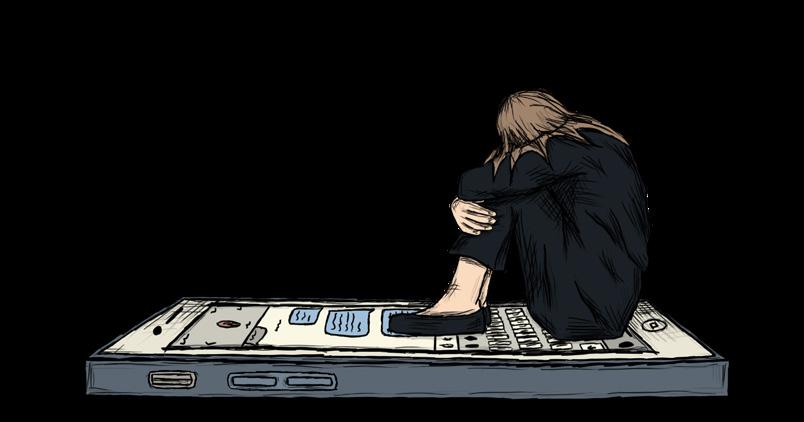
64 MEDIUM MAGAZINE
“I hope no one notices that I am gone.”
I raise my arms and swing them back and forth.
Stupid!
I clench my teeth and put on a smile. I can feel my body trembling. I am not sure if it is because I am cold or because I am nervous.

You’re doing it wrong!
I spot a chair in the corner of the room and squeeze through the crowd in its direction. I hope no one notices that I am gone. No one will care.
I sit down on the chair, try to blink the freshly-formed tears away, and take out my phone. I need to text someone. I am feeling miserable again. I cannot text my friends, they will think I am crazy. I cannot text my grandma, she will not understand.
I hate it here, and I hate myself. I’m not dancing ever again, I say in a message to my mom.
She is offline. But I do not care. I do not need her reply. I just want to tell her how I feel. No, but I also want her help.
I can’t do it. I can’t be like Amina or my other friends. They’re all enjoying the party. Why the fuck can I not do the same?
She is still offline, but I continue pressing the letters on my screen harder. The tips of my fingers begin to burn.
Everyone’s dancing, and I’m sitting in the corner alone. And they don’t care. Why am I always the one who chases others? I want someone to want me for once.
I am locating the letters on the keyboard from memory because I cannot see anymore. Tears are falling on my phone, and I keep smudging them with my fingers.
Why do they always leave me, Mom? Dad and then Milana. She was my best friend! And then she left with no explanation!
I wipe the phone screen with the edge of my dress, but the wet stains
only get worse, leaving a white cast of salty tears speckled with crumbs of black mascara. Maybe nobody needs me here. Nobody wants me. Even you. I’ve been texting you for 10 minutes now, and you’re still offline. I hate being here. I hate being me. I press send.
19
My new knitted black sweater does not go with anything. I have been thinking about what to pair it with since this morning, and the outfit Gods are refusing to respond to my demands. The most plain black sweater stares at me from my closet. It laughs at me, and the $60 I spent on it.
In the back of my closet, among my pink, yellow, and light blue sweaters, I find a pleated black skirt from the ninth grade. As I pull it off the hanger, I am reminded of my last night at home before I left for Toronto. I was miserably trying to pack my whole wardrobe into one huge suitcase, while my mom was watching my every step like a hawk. “I can almost guarantee you’re never going to wear that tiny rag there,” she scoffed at me, holding up the skirt. To be honest, I have not worn it since arriving here two months ago. I
guess today is that “warm” February evening when I dare to walk outside in my obscene skirt.
I pull on my black tights under it. It’s a mini skirt on my body.
I barge into my roommate’s bedroom and ask, “Is this too slutty?”
“No,” says Miggy, after a moment of hesitation. “It’s just short, but it looks fine.”
“Do you think he’ll like it?”
“I think so. He likes it when you wear black.”
I look at my phone. It is almost 8 p.m. I hurry back to my room to do my makeup and hair before my boyfriend shows up to take me on my first official date.
I met him during my first year at the University of Toronto Mississauga the week I moved into the Erindale residence. He lived in the next room down the hall. He likes anime and fashion. He listens to these weird but melodic songs by different Japanese artists. I do not understand their meanings, but he seems to always know their translation. Usually, the songs are quite depressing.
He works out almost every day because he wants to compete in Men’s Classic Physique. I am not sure if he actually likes the gym, but he stays consistent, which is good… I guess. We do not have that much in common, to be honest. He does not read much and is not interested
MM 65
“I don’t want to be the way I was when I lived at home.”
in travelling as much as I am. But we love each other, apparently, despite all the differences. They do not matter to me anyway because when I am with him, I finally feel normal. He protects me in a country where I barely know anyone yet.
He likes it when I draw a classic black wing rather than “clown-like” designs with colourful eyeliner. My pink and purple pencils have been abandoned to the bottom of my makeup bag for a few months now. I want him to like me. Tonight, I use my black NYX eyeliner again. It matches my all-black-goth-girl outfit.
I am in the middle of curling my hair when I hear my phone buzzing. “Mama” pops up on the screen. I roll my eyes at my phone before picking up the call. I have not talked to her for over a week now.
“Are you out of your mind?!” I hear her squeaky highpitched voice over the phone.
I stay quiet.
“I have called you like 10 times since the last time we spoke! Could you at least text me that everything’s alright? How am I supposed to know you’re alive?”
“I’m sorry,” I say when she finally stops screaming.
“Anyway,” she says after a disappointed sigh. “It’s the Day of the Holy Trinity today. Happy holiday.”
“Please, stop, mom. I don’t want to hear anything about religion now.”
“I just reminded you about the holiday, that’s it. Why are you saying that?”
“Because I finally feel like I’m normal here, okay!”
I snap back at her. “I don’t want to talk about the past. I don’t want to be the way I was when I lived at home. Please, just let me relax. Let me be the way I am!”
“I never forbade you to be whoever you wanted. I just think it’s good to have faith in your life.”
“Well, I don’t.”
I hang up and throw the phone on my bed.
What is wrong with you? The question instantly bursts into my mind.
I hear a knock on the door and realize it’s time to leave. My boyfriend walks in, and I immediately run to hug him.
Now, everything will be fine.
But my smile quickly fades when I notice the lingering smell of weed coming from his jacket. Again. I squeeze my eyes, my face behind his back.
Don’t say it. Don’t say it! Please, don’t ruin the night by asking him. Stay calm. He likes you. You like him. There’s nothing wrong. Stop!
I break away from his hug and grab my bag.
“Is everything okay?” he asks.
He is smiling at me. I know that smile. It’s not real. He doesn’t smile like this when he is sober. It has been a while since he’s been sober.
“Yeah!” I smile back at him. “Let’s go. We’ll be late for the movie.”
20
The clock strikes 9 p.m. I am sitting on my bed munching on a stroopwaffle in my new room. The collection of stories by Hemingway that my roommate Tiana gave me for Christmas hasn’t moved from the blue stripy rug by my bed. I was hoping to get to it ever since my roommates and I moved into this apartment last weekend.
The warm light of an Ikea table lamp illuminates the corner where my desk ends and my bed begins. There, on the edge of the desk, sits a small icon of Hail Mary. I like having it my room, even though I do not pray nearly as often as my mom would want me to.
There is a small orange bottle next to the icon. “Escitalopram,” reads the tag on the bottle. “Take one tablet once daily,” is inscribed right below. I have been taking them ever since I broke up with my boyfriend four months ago. Sometimes, I forget, and I get nauseous. But I try to stay consistent.
In my new room, I have a tall mirror facing the window on the opposite wall. The mirror stands right in front of my bed. Each morning I wake up and see my reflection. When I toured the apartment a month ago and walked into this room for the first time, I felt as if the large mirror was trying to attack me. It seemed too big, too omnipresent. I did not stop to check my reflection. I left as quickly as I could to relieve the strangling feeling.
Now, I’m looking in the mirror, and I’m smiling. An honest smile this time. I feel calm. I haven’t felt like this for a while. A strange warmth spreads inside of me as I look at my reflection dressed in an old set of pajamas and a pair of glasses. I admire my bare face with a few pimples. I barely notice them anymore.
A sudden thought about a reading response I have due in two days disturbs my peace for just a second. Before the anxiety creeps on me, I turn on “Brazil” by Declan McKenna and start dancing on my bed. I am watching the way I move my arms and my feet. It’s perfect.
I realize that I have probably been staring at myself for too long now.
It’s okay, echoes in my mind. This is for all the years you did not see yourself. This is for all those years you thought you’d only be able to be happy with someone or because of someone. Now, let yourself be happy just as you are, with all of your awkwardness and differences, but never despite them.
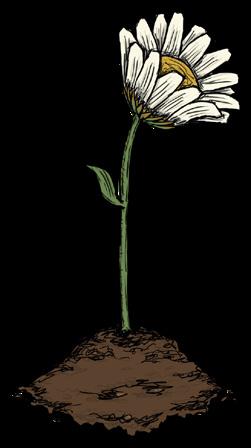
66 MEDIUM MAGAZINE
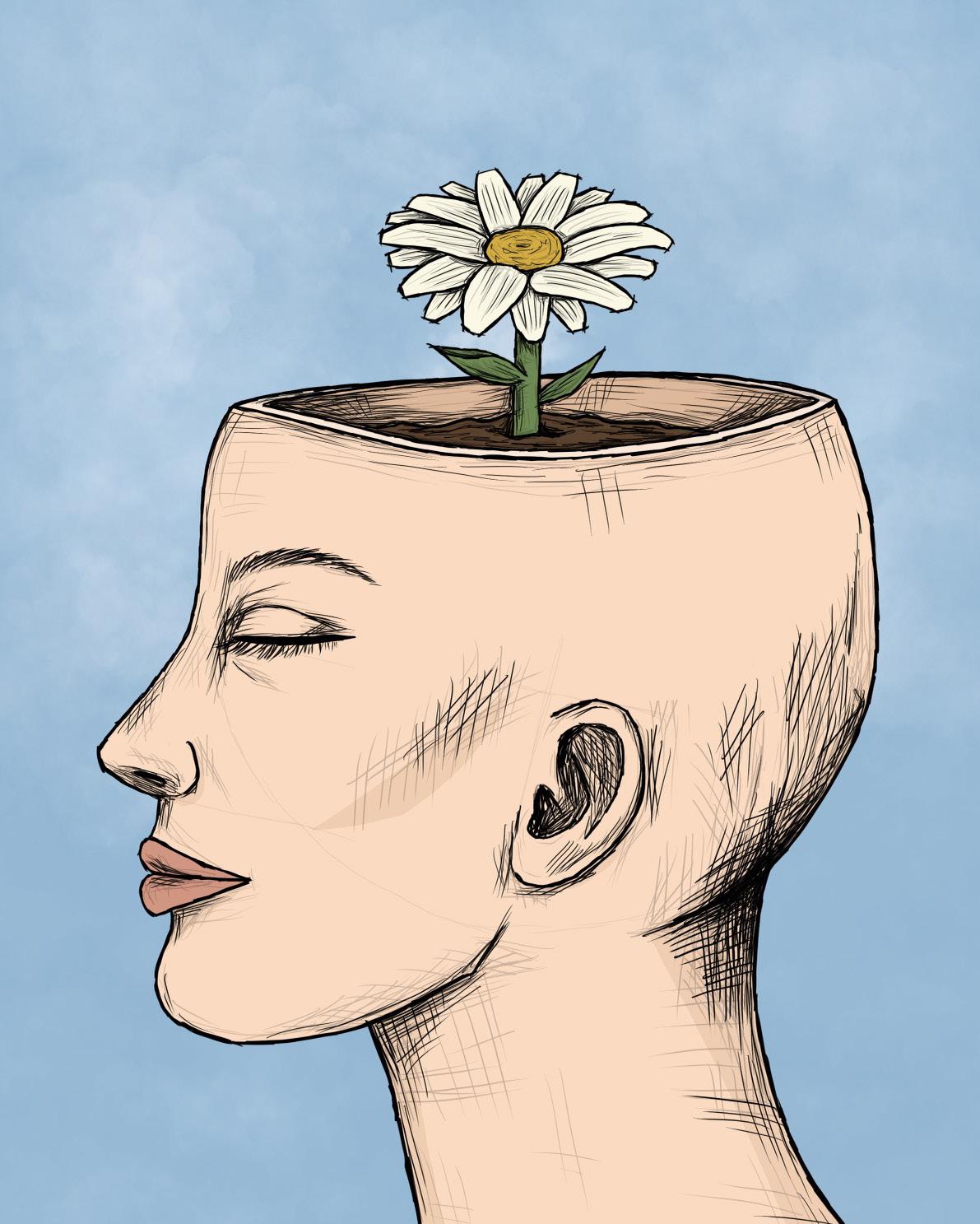
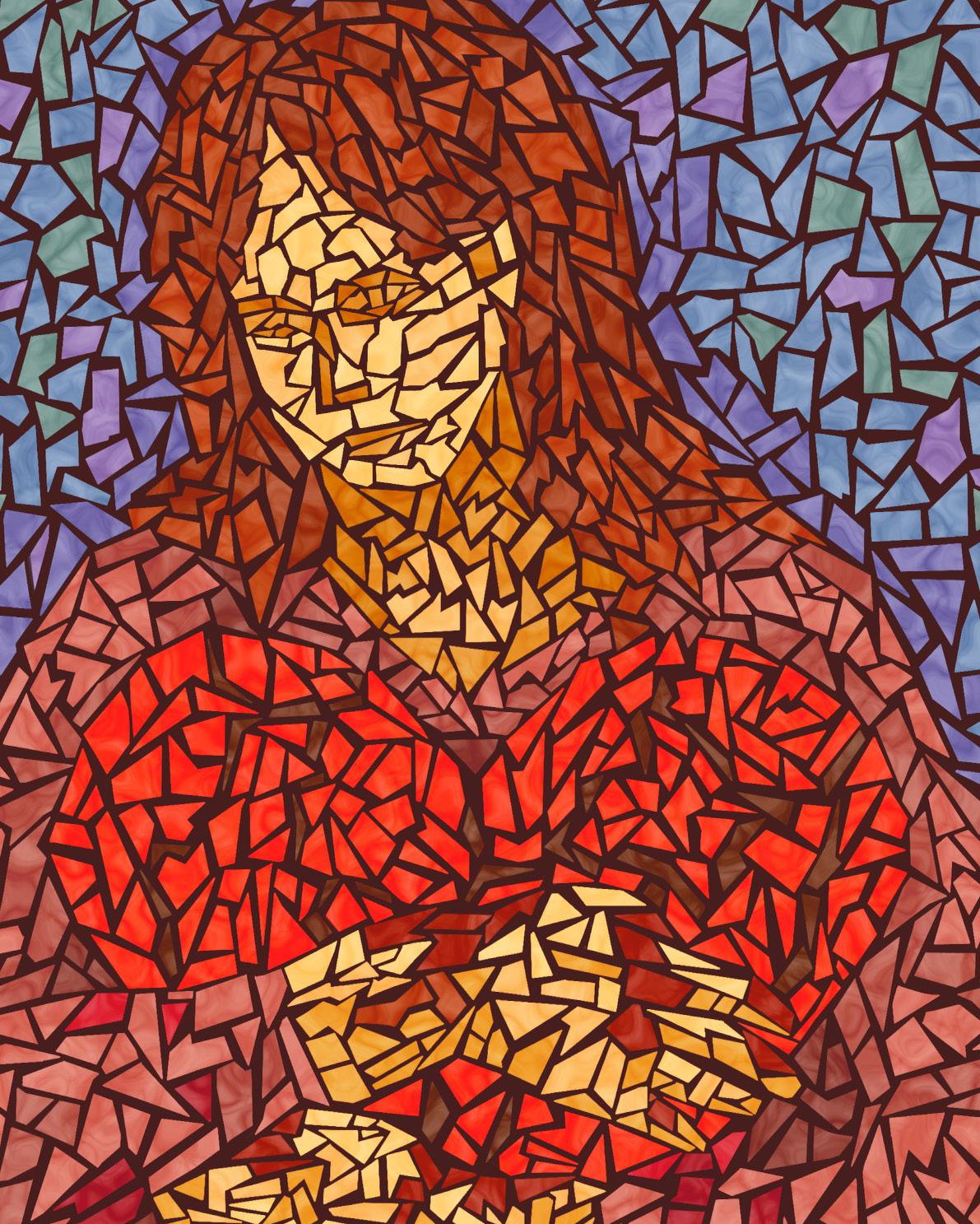
What Happens Next is Up to You
Erin Delaney
Getting pregnant is a lot like breaking glass. It’s easier to do by accident than on purpose.
Glass breaks for different reasons. Bottles shatter against the hulls of brand-new ships when christened before their maiden voyages, casting spilled wine and slivered pieces for years of safe journeys across an unpredictable sea. Wrapped tightly in white woven fabric, glass is stepped on at Jewish weddings to mark the end of the ceremony and to signify the beginning of a commitment.
Broken glass can be a celebration; it can be a sign of commitment, of goodwill, of trust.
But sometimes, broken glass can simply hurt you.
Getting pregnant is a lot like someone dropping a glass on the kitchen floor. You hear it shatter, but you’ve been promised they swept it. It should be fine. You can walk barefoot. Don’t worry about it. Stop asking.
Maybe they dropped the glass and didn’t bother to clean it up. They didn’t even try to protect you or warn you of what you were getting into.
Sometimes, it can be the person you love that throws glass directly at your feet, embedding shards in your skin before you can think to jump out of the way and protect yourself.
I did my best to tiptoe around the barely noticeable silvers. I would ask politely, repeatedly, insistently, if he could not leave broken glass where he knew I would step on it. But despite my politeness, or my firmness, or how many times I would stand up for myself, I was always scared of what I could be walking into.
You can avoid thousands upon thousands of pieces, but all it takes is a single tiny sliver, and the blood starts pooling under your feet.

I found out that I was pregnant on the day Queen Elizabeth II died. I made the appointment for my abortion less than five minutes later. Even though I was barely a month pregnant, I had been in excruciating pain for weeks. My lower back alternated between sharp stings and terrifying numbness. I didn’t feel any connection to what was happening inside me; I felt only fear.
The man who caused the pregnancy and the resulting pain was my boyfriend of more than two years. He said he wanted me to be the mother of his children. I often loved him more than I loved myself; but lately it was
getting harder to like him and the person he could be. We couldn’t have a child now. Not this young, not when we didn’t have any money, and certainly not with how bad his drinking was.
In the months leading up to the pregnancy, I had been living in the shadow of his alcoholism. At first, he was a fun drunk. He would dance with me and say impossibly sweet things, so sweet that they would make my teeth hurt. But the more he drank, the more sour he became. Some summer nights, he would pass out and leave me in graveyards of empty bottles. All alone, I would spend hours staring at a screen, Googling “boyfriend is a binge drinker?” and hoping to find advice that wasn’t “leave him before he hits you,” or “it’s only going to get worse.” Every answer was the same. He will hurt you, if not physically, then emotionally. You will not escape unscathed.
I wanted to leave a month before I got pregnant. But the fear of what he would do if I left was stronger than my desire to go. I wanted to be a good partner. I didn’t want to be the one to give up on us. He promised to try to get sober. I wanted to believe him. It’s strange how quickly the cracks started to spread. In the week between telling him I was pregnant and my abortion, he was no longer the person I fell in love with. Our bond fractured despite how hard I was trying to hold it together.
A few days after I told him I was pregnant, I picked him up from work. I had never seen him so angry. He opened the car door, violently threw his bags in the car, and slammed it shut behind him.
“Hey, hey, it’s okay. You don’t have to do all that,” I said.
“Just take me to the LCBO.” He didn’t look me in the eyes. Usually when I picked him up after work, he wouldn’t be able to stop smiling. His eyes would light up, and he would cover me in kisses before asking how my day was.
“Okay,” I said, meekly. I wanted to say, “No, drinking won’t make you feel better, it’ll just make everything worse.” But I was scared of making him more angry. The pain in my lower back was all too consuming. I could barely stand up, let alone stand up to him.
We stopped at the LCBO before we went to his house. I sat uncomfortably on the couch as he downed one, two, five, six drinks.
MM 69
“Only I decide the pieces that will make up the rest of my life.”
“Hey, I know you’re stressed, but maybe this is too much,” I pleaded, putting my hand on his shoulder.
He waved me off. “Yeah, yeah,” he slurred, “I’m not gonna drink much after this one.”
I couldn’t tell if he was gesturing to his half-full glass or the half-empty bottle; he had a hand on each. His grip was so tight that it seemed like they were going to shatter from the hold of his addiction.
I told him my back was acting up again and excused myself to his bedroom. Lying on his bed, I wondered how we got to this point. I knew he would never hurt me physically, but there were worse things to be afraid of than physical pain.
It dawned on me that this could be my whole life. I could spend decades feeling like I had to hide from the person who loved me. If I didn’t have an abortion, I’d have to devote my life to protecting someone far more vulnerable than me, and I didn’t think I would be able to do that.
My abortion was on a Thursday morning. The women working at the clinic were kind. It had been a long time since I was regarded with tenderness. I realized that I forgot what it felt like. The doctor performing the procedure had the same first name as me. It felt like the universe was telling me that the only person who could get me out of this was myself. As I sat in the recovery room, I gazed out the window. Across the street was the hospital where I was born. The glass had a slight reflection in the light. I could see myself. The person staring back at me looked sad. Undeniably, I felt grateful for even having the ability to free myself from this pain and the future that came along with it.

My boyfriend insisted on taking the day off work so that he could take care of me as I came out of sedation. I tried to tell him it wasn’t necessary, that he didn’t have to, but he didn’t give me a choice. After he brought me home from the clinic, he went out to pick up my prescribed antibiotics. When he came back from the pharmacy, he tried to comfort me as I fought bouts of dizziness and waves of nausea. As I settled back in bed, his words of comfort became pointed and unsettling. I begged him not to
do this today, and he got up and left, disappearing for a few hours. I didn’t know if he would even bother coming back. I couldn’t tell what would be worse: his presence or his absence.
When he did come back, he sat on the edge of my bed and gave me an earnest apology. It surprised me, the fact he could show me mercy.
I didn’t realize it then, but he was already drunk.
As the afternoon went on, the words coming out of his mouth went from rude to insulting, his speech becoming more slurred. I kept asking what was wrong, why he was acting this way. I thought for a moment. Oh, he’s acting like he does when he is drunk. But he can’t be drunk, not today. I shouldn’t be so judgemental.
An hour later, he admitted that he had taken a trip to the LCBO and had been drinking heavily throughout the day. When I asked him why, he just shrugged and said he felt scared. He stood up, stumbled into my bathroom and slammed the door behind him. I heard him vomit for several minutes before I went upstairs and grabbed a glass. Filling it with cold water, I let it overflow and trickle down my fingers, just so I could feel something that wasn’t intense disappointment and debilitating despair. I set the glass on the table for him when he was done.
The bottles were in his car. When I found them, a wave of jealousy rippled through me. These glass vessels were more important to him than I was. He must have gone home when he disappeared earlier, because his parents left a Post-it Note on the whiskey bottle that read “Please don’t drink! We love you :).”
Carrying the bottles back inside, my eyes filled with hot tears. He was sitting on my bed. I took a seat on the bathroom floor and placed each glass bottle gingerly on the tiles, untwisting each cap before tipping them over the rim of the toilet. The brownish-orange liquor swirled in the bowl and splashed against the flecks of vomit left behind for me to deal with.
A deep, inescapable feeling of shame consumed me. A dark cloud cast a shadow on the hopes I had for us and any trust I had left in him. Our relationship wasn’t just cracked anymore; it was shattered. The jagged pieces of every moment we had shared were piercing me right through the heart.
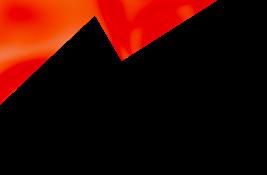


All I could think about was the fact that I had an abortion, and instead of being there for me like he promised—like he insisted—my boyfriend got drunk. While I was waiting for him to pick up my antibiotics, he was buying booze. When I went to the bathroom to check if I was bleeding a normal amount, he ran back to his car to swig mouthfuls of whiskey, returning before I could even tell that he was gone.
This will always be a story that I will have to live with. I will always be a person that this had happened to.
Before I set the bottle of Fireball back down, my eyes landed on the back label.
“What you have here is a smooth whiskey with a fiery kick of red-hot cinnamon. It tastes like heaven, burns like hell. What happens next is up to you.”
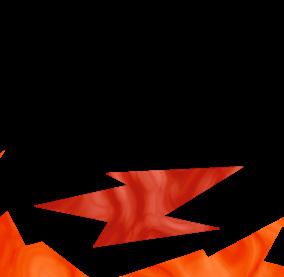
Two days later, he was back in my bedroom, sitting on the edge of my bed. He hugged my dog when he
came in but didn’t try to touch me. He hadn’t spoken to me at all since the day I had my abortion. He told me he needed time to be alone. That he needed to work on himself. There was no apology, no remorse in his words. Only coldness, a slight anger aimed at me as he spoke.
I was sitting on top of the covers, hugging my knees, and hiding my face. I wondered why he couldn’t have come to this realization a month ago.
Taking a deep breath, I lifted my head up.
“I think it’s time for you to go,” I sighed.
Before he left, he picked up my hand, holding it tight. I looked him in the eyes, and there was a glimmer of the man I love, hidden somewhere in this cruel person staring back at me. He pulled me in, hugged me, and held me close. When he let go, he was still gripping my hand. He hugged me again. I could feel the part of him that didn’t want to go, the part that couldn’t believe what he had done. I started to cry, my tears falling into the creases of his neck. He pulled back from the hug for a split second, only to pull me close a final time. When he finally released from the embrace, he couldn’t let go of my hand. Tears were beginning to creep out of the corners of his eyes. He firmly placed my hand back on my bed, like a cold glass that he had just downed, a can he had just crushed, an empty bottle that was no longer of purpose to him.
One of the support groups I attend is in a church on Bloor Street West in Toronto. Every Saturday morning, I put myself together and ride the subway for 15 stops to sit with strangers who pour their hearts out.
The room we meet in is on the east side of the church. It’s a cozy space with floral couches and big colourful windows. As the meetings go on, the sun rises higher and higher,
and beams brightly throughout the room. The stained-glass casts intense speckles of colour on everyone. A splash of red over one’s face, a beam of blue covering a few, the morning light dripping across the room, drenching all of us in a flood of yellow.

I see a lot of myself in these people. I see futures I would have lived. All of them have been affected by someone else’s drinking. They’ve all had heart-shatteringly awful things happen to them, broken seemingly beyond repair. But right now, they’re letting the light shine through. Picking up the pieces, slowly placing them back together, and making something stronger and far more beautiful than it ever was before.
Piece by piece, I feel the fragments of myself slowly coming back together. They don’t fit like they used to; I’m not sure they ever will. The only way to make stained glass is to break perfectly intact pieces and place together parts that would’ve never fit if they hadn’t come apart. I can feel the light I always had inside myself slowly returning, and it’s breathing new colours into my life, bold and brilliant in ways I never could have expected.
My life doesn’t have to be defined by someone else’s drinking. My future isn’t controlled by someone who would so easily cast me aside for his own selfish desires. I had the freedom to choose not to be a mother. I have the irreplaceable gift of not spending years of my life repeating the same patterns. My life can be a mosaic, a work of art, a stained-glass window. A beautiful thing born out of terrible, unpleasant experiences.
Every night, before I fall asleep in the room where my heart was shattered into pieces several times over, I stare at the bottle of Fireball that he left behind. I dropped off all his stuff at his parents’ house a long time ago, but I kept the bottle as a token to remind myself of the power I have.
What happens next is up to me. Only I decide the pieces that will make up the rest of my life.
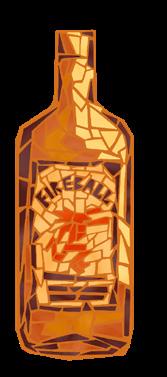
MM 71
72 MEDIUM MAGAZINE
Dear You, You Are Art (4/4)
Kareena Kailass
When you finally take a step back to admire your masterpiece, you will finally understand how far you’ve come.
You are sharp curves and smooth lines. You are every speckle of paint, every erased pencil mark, and every accidental smudge.
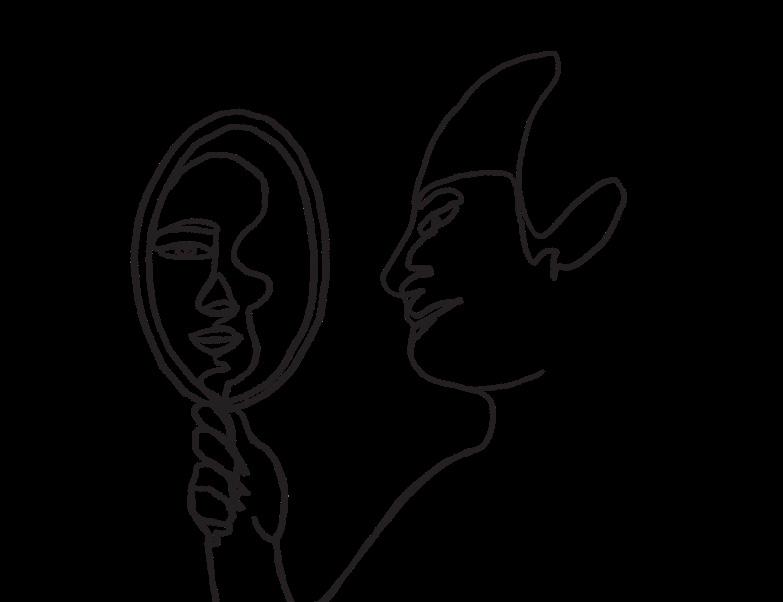
Every now and then, you might question what your next addition will be. You will be pensive and ponder, worrying you may never achieve your ideals.
In this abyss, you must be confident. Remember that all the visions you yearned for but lost are progress. Each missed mark taught you something new and turned you into who you are today, who you will be tomorrow, and every day after that.
But still, your piece is far from finished.
What will it take to keep moving forward?
It won’t only be a strong will; you will need an open heart, an open mind, and an open set of arms, waiting to comfort and be comforted.
But right now, you’re letting the light shine through. Picking up the pieces of your soul, slowly placing them back together, and making something stronger and far more beautiful than it ever was before.
Although you will be stuck in the cycle of breaking and rebuilding yourself, you know that growth is the product of your progression.
And if this is the consequence of being art, I hope you never go back.
I promise you, there is so much more to come.
Until then, You
MM 73
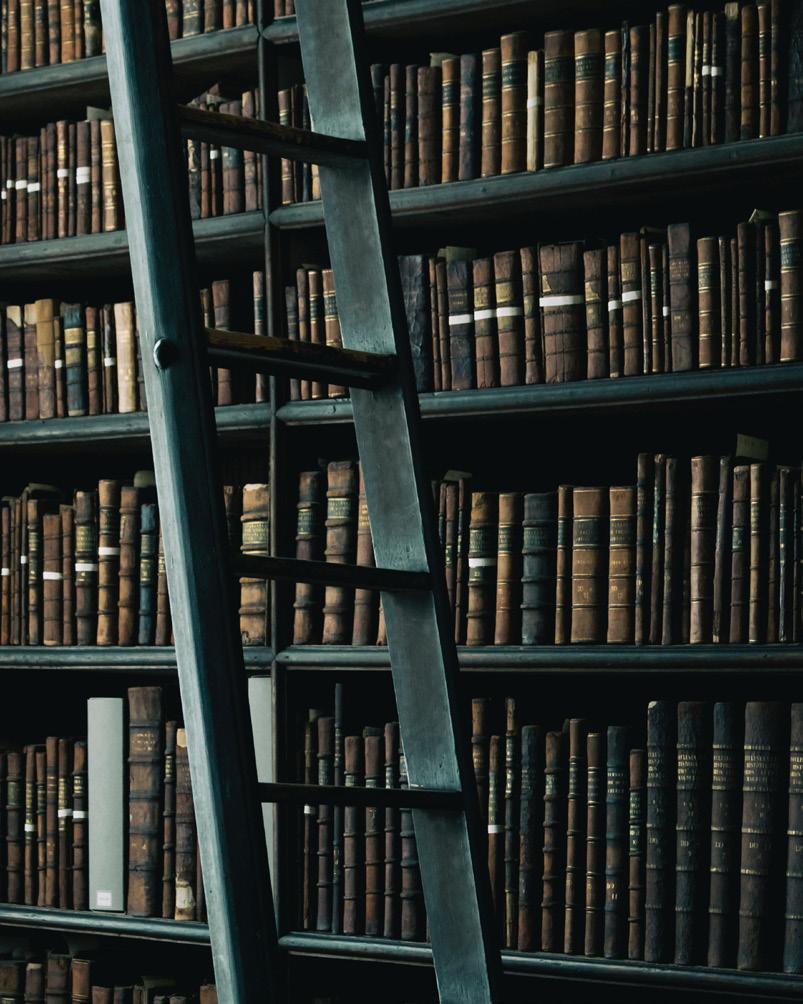
HENRY BE/UNSPLASH
References

Painting Love: A Reflection on Love and Museums
Bast G. Carayannis E. G. & Campbell D. F. J. (2018). The future of museums. Springer. https://doi. org/10.1007/978-3-319-93955-1
Fromm, E. (1962). The art of loving. Harper & Row.
Wojnarowicz, D. (1991). Close to the Knives: A Memoir of Disintegration. Vintage Books.
Pop Culture is Dead—But It’s Probably for the Best
2014 Worldwide Box Office. Box Office Mojo. (n.d.). https://www.boxofficemojo.com/year/world/2014/ 2022 Worldwide Box Office. Box Office Mojo. (n.d.). https://www.boxofficemojo.com/year/world/2022/ Apple Newsroom (Canada). (2023, Februrary 10). Celebrating 100 million songs. https://www.apple. com/ca/newsroom/2022/10/celebrating-100-million-songs/
Danesi, M. (2018). Popular culture: Introductory perspectives (Fourth edition.). Rowman & Littlefield.
Ingham, T. (2022, October 7). 100,000 tracks being uploaded to Spotify and other services daily. Music Business Worldwide. https://www.musicbusinessworldwide.com/its-happened-100000-tracks-arenow-being-uploaded/
Holding Hands with Grief
Mayo Clinic. (2020). COPD. Mayo Clinic. https://www. mayoclinic.org/diseases-conditions/copd/symptoms-causes/syc-20353679
MM 75
Biographies
Aia Jaber
Aia Jaber is a fourth-year Psychology and Philosophy student who enjoys writing for The Medium as a columnist in her spare time. In her piece, she approached mental health in a vulnerable way with the hopes that other students learning to understand their anxiety feel heard and appreciated. She currently writes for two other publications, and hopes to become a psychotherapist in the coming years to continue helping others in a compassionate way.
Aidan Thompson
Aidan Thompson is a Copy Editor at The Medium and a fourth-year Professional Writing and Communications student at the University of Toronto Mississauga. He has a keen interest in the cultural impacts of media, technology, and entertainment, and has a compelling case for why Paddington 2 is the greatest movie of the last decade. Thompson’s writing is sharp, insightful, and just funny enough to soften his cynicism.
Emily Rogers
Emily Rogers is a third-year student at the University of Toronto Mississauga studying Environmental Science and Political Science. She’s most drawn to forensic-level analyzes, be it an article, essay, or the rare creative venture. Writing, to her, is the simplest and most honest means of communication. She loves how a story can breathe life into the most mundane aspects of the human experience.
Elizabeth Provost
Elizabeth Provost is a Russian-Canadian writer, editor, and aspiring art conservator. She is a fourth-year student at the University of Toronto Mississauga studying Chemistry and Art History. Serving as Volume 48 and 49’s Editor-in-Chief of The Medium, Provost creates a space for students to feel represented, inspired, and heard through writing, and where editors can be introduced to the newsroom dynamics. She recently presented a TEDxUofT talk on the power of student journalism. You can connect with Provost on her website: www.eprovost.crd.co
Erin Delaney
Erin Delaney is a simple woman who feels joy, pain, and confusion among other things. She served as the editor for the short lived but much loved Satire section for The Medium in 2019-2020. While she normally focuses on writing more light hearted comedic material, her story was born out of desire to free herself from second-hand shame. She is a big believer in accepting the things you cannot change and changing the things you cannot accept.
Kareena Kailass
Kareena Kailass is a third-year student completing a double major in Criminology and Socio-Legal Studies and Philosophy, and minoring in Forensic Science. She is currently serving as The Medium’s Opinion Editor for Volume 49. Through her involvement and contributions with The Medium, Kailass hopes to foster a safe and trusted space, while encouraging others to let their voices and stories be heard.
Jestina Hajjar
Jestina Hajjar is a fourth-year English specialist completing her final semester at the University of Toronto Mississauga. She wrote Performance Anxiety: The Pressures of Performing Queerness to address frustrations when it comes to the tiresome experience that is performing queerness. As a Queer, Arab woman, most of Hajjar’s writing and research is dedicated to normalizing Queer POC experiences while making space to discuss issues that are prevalent within the community.
Juliana Stacey
Juliana Stacey is a fourth-year student at the University of Toronto Mississauga studying English and Professional Writing and Communication. She has worked with The Medium for two years—first as a Copy Editor, and now as the publication’s Managing Editor. Stacey is also a Student Affiliate with Editors Canada. She is dedicated to the study of language and communication and is passionate about helping writers communicate their stories in ways that resonate with a wide variety of audiences. You can connect with Stacey on her Instagram @julianastacey or on LinkedIn.
76 MEDIUM MAGAZINE
Manjot Pabla
Manjot Pabla is a recent graduate from the University of Toronto Mississauga and Sheridan College with a specialization in Art & Art History, primarily working in printmaking and design. Currently, she is the Design Editor for The Medium’s 49th volume—her second year fulfilling the role. In her work, she explores themes of pain and suffering, specifically dealing with the philosophical and psychological impact it creates. Most of her work deals with internalized conflicts between the mind and the body.
Olga Fedossenko
Olga Fedossenko is a second-year student double majoring in Professional Writing and Communication, Culture, Information & Technology. She joined The Medium this year as an Associate Features Editor and has so far enjoyed interviewing many interesting people. In her spare time, you can find her taking long mental-health walks around the University of Toronto Mississauga or downtown campuses and listening to Måneskin. She hopes that her readers will see themselves in her very personal piece.
Radhia Rameez
Radhia Rameez is a fourth-year student double majoring in Biology for Health Sciences and Professional Writing and Communication. In 2019, she moved to Canada from Sri Lanka, where she worked for three years as a writer and journalist. She still misses the year-round greenery of the tropics but is learning to like (or at least tolerate) the winters here. When she’s not writing or studying for midterms, Rameez likes long walks, greyskied rainy days, and reading children’s books. Rameez serves as The Medium’s Associate Sports & Health Editor for the publication’s 49th volume.
River Knott
River Knott is currently working for The Medium as a Copy Editor while finishing up his specialist degree in Political Science. He hopes to pursue a career in law or government in the future, but has every intention of continuing to engage with his passions in reading and writing all along the way. His newfound drive and confidence can withstand anything, including the impact of an SUV!
Rola Fawzy

Rola Fawzy is a storyteller first and a writer second. She understands life through narrative, and believes in its potential to heal both the narrator and the receiver. Having always been a sucker for a good story, Fawzy does her best to impart on the stories she collects through living. When she is not writing, she is doing a whole lot of living.
Samira Karimova
Samira Karimova is pursuing studies in both Neuroscience and Chemistry while also continuing her work in photography. With a strong interest in the intersection of arts and sciences, she is a part of the SEDI Lab at the University of Toronto Mississauga, where they explore the role of visual arts on children’s social and emotional development. Karimova finds importance in observing patterns in life, navigating with compassion and love, and starting each day with a warm cup of coffee. She is Volume 49’s Photos & Design Editor.
MM 77
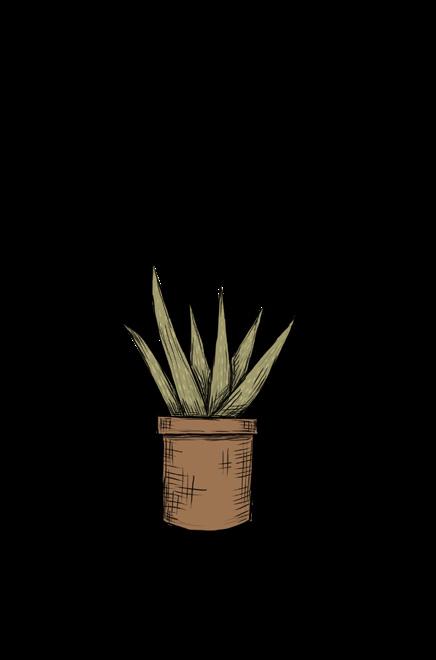
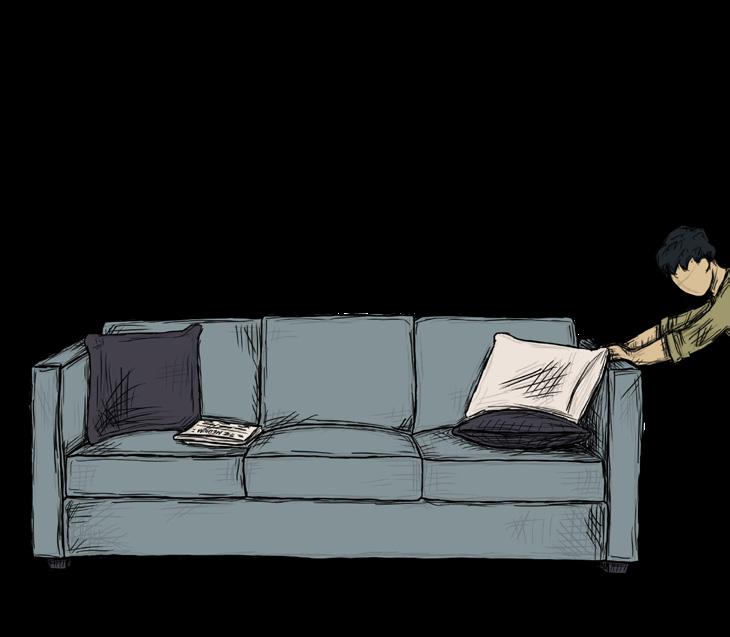
PHOTOGRAPHY
BACK COVER BY QUARITSCH






























































































